Sneak peek: API documentation generated for all your code
Stephen Gutekanst on July 22, 2021
Here's a sneak peek of our latest experiment to bring API documentation to all your code, generated by LSIF code intelligence data.
Read more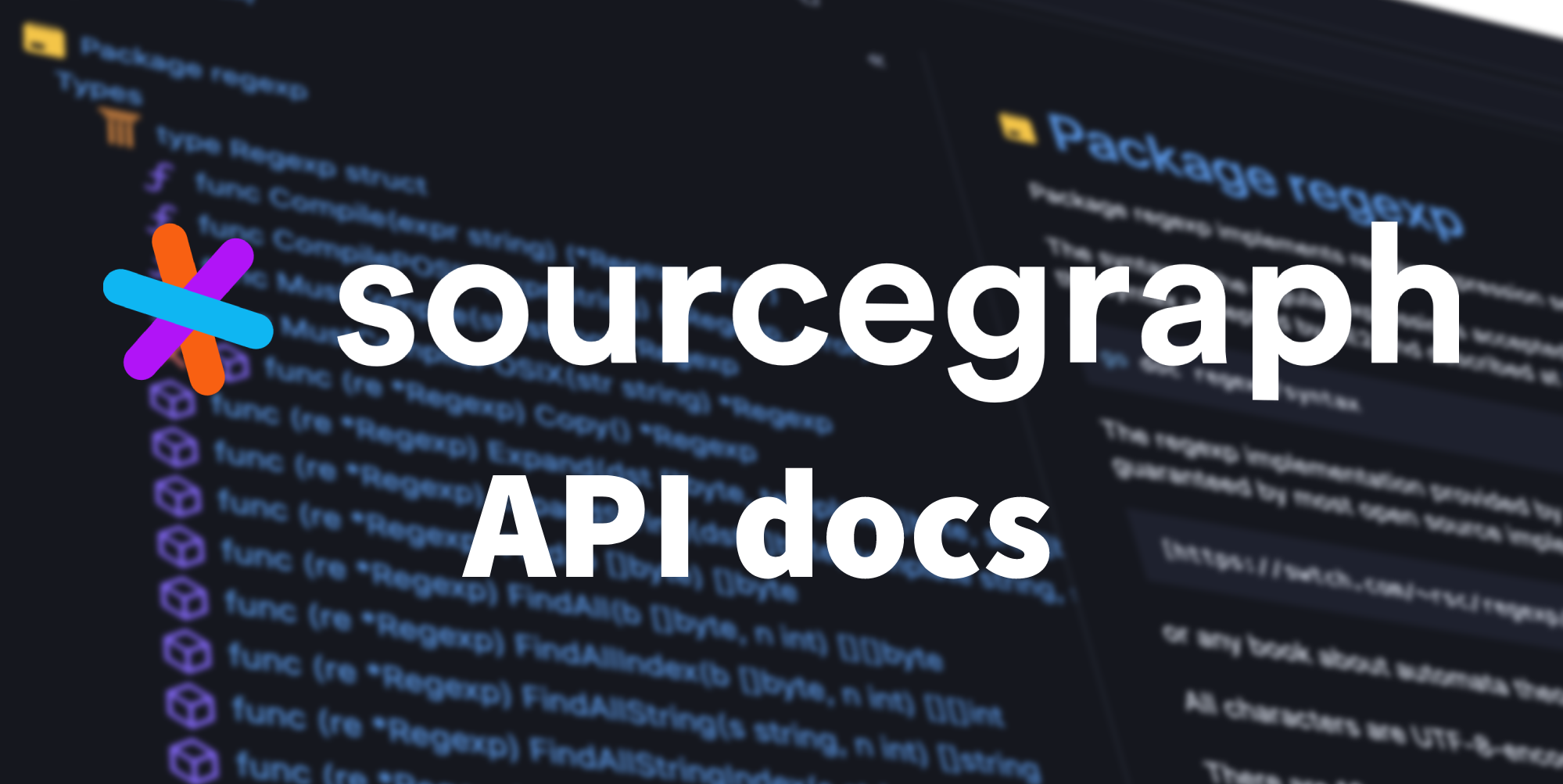
Sourcegraph 3.30 release
July 20, 2021
Sourcegraph 3.30 introduces support for publishing batch changes from the UI, Code Insights dashboards, a new search reference in the search sidebar, and experimental API docs.
Read more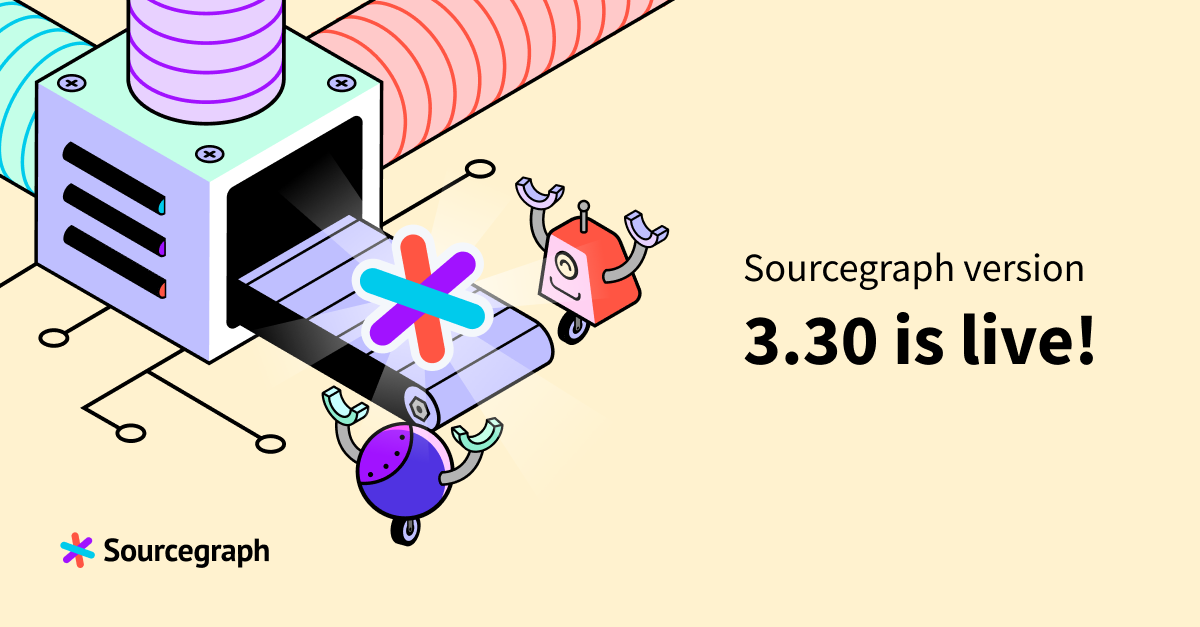
Developer onboarding with Jean du Plessis, Director of Engineering, Sourcegraph
July 16, 2021
Jean du Plessis, Beyang Liu
For the final segment of our three-part series on developer onboarding, we chat with our very own Jean du Plessis, director of engineering at Sourcegraph.
Jean talks about the role checklists can play in onboarding, why context is king for coders, how to facilitate context transfer, and how software engineering can seem like one part adventure, one part archeology. We also touch on the topic of continuous onboarding, and how it relates to general developer productivity.
'I'm happy to represent the minimalist setup lifestyle': Dev Tool Time with Leah Culver
Vanesa Ortiz on July 15, 2021
Leah Culver, iOS Developer at Twitter, joined us to share some developer life hacks, her minimalist, no-config philosophy for tools, and her secret for reaching inbox zero.
Read more
Developer onboarding with Limor Bergman, PowerToFly and DigitalOcean
July 14, 2021
Limor Bergman, Beyang Liu
In this episode, we cover part two of our series on developer onboarding with Limor Bergman. Limor's career spans many storied companies: she's been an engineering manager at Sun Microsystems and VMware, director of engineering at DigitalOcean's cloud computing division, and is now the director of mentorship at PowerToFly where she helps women in technology uplevel and make big career moves. She shares with us her approach to ensuring knowledge transfer, how to onboard people into legacy code, and talks about what has changed over the past 20 years for software engineers.
Announcing Sourcegraph's Series D
Sourcegraph on July 13, 2021
We raised a $125M Series D to bring really great code search to every developer in the world. With this new funding, we’re prioritizing innovations that will push the frontier of developer experience.
Read more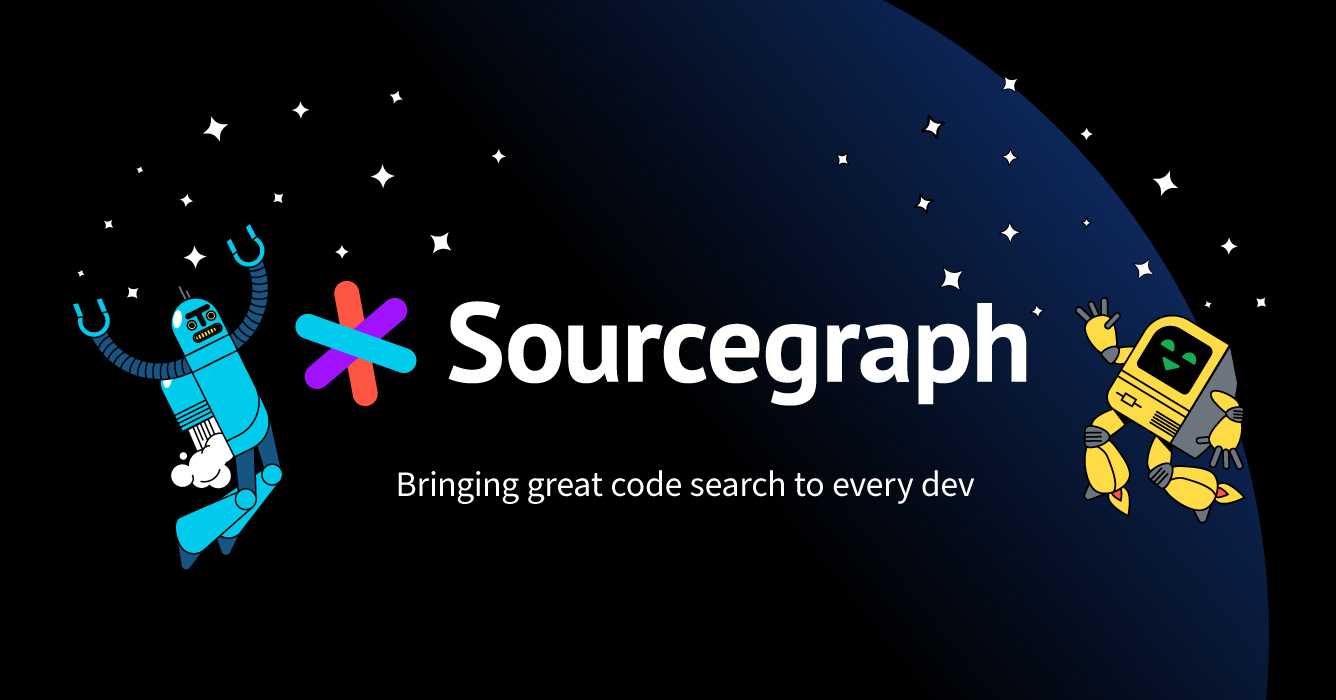
The future of code search
Beyang Liu on July 13, 2021
We raised a $125M Series D to bring really great code search to every developer in the world. With this new funding, we’re prioritizing innovations that will push the frontier of developer experience.
Read more
Developer onboarding with Ryan Djurovich, DevOps Manager, Xero
June 30, 2021
Ryan Djurovich, Beyang Liu
We're kicking off a new season of the Sourcegraph podcast with a three-part series discussing how engineering leaders onboard new teammates.
First up is a guest from season one, Ryan Djurovich, DevOps Manager at Xero, one of the largest accounting software companies in the world. He talks about how to strike the right balance between autonomy and consistency, the importance of tools in the process, and how to foster a high-trust environment.
How not to break a search engine or: What I learned about unglamorous engineering
Rijnard van Tonder on June 25, 2021
When we switched to a new search query parser in September 2020, you'd never know that anything had changed. This is an account of the rigorous testing that happened behind the scenes to ensure a seamless transition.
Read more
Sourcegraph 3.29 release
June 23, 2021
The Sourcegraph 3.29 release introduces improved search results ranking, makes it easier to create Code Insights, and includes support for bulk actions with Batch Changes.
Read moreMeet the new Sourcegraph UI
Rob Rhyne on June 9, 2021
We're launching an entirely new visual design for the Sourcegraph UI today! We've added so many features to Sourcegraph in the last few years, that we needed an entirely new visual design to keep up with our advancements. Let's take a look at some of the new designs and how they will help users n...
Read more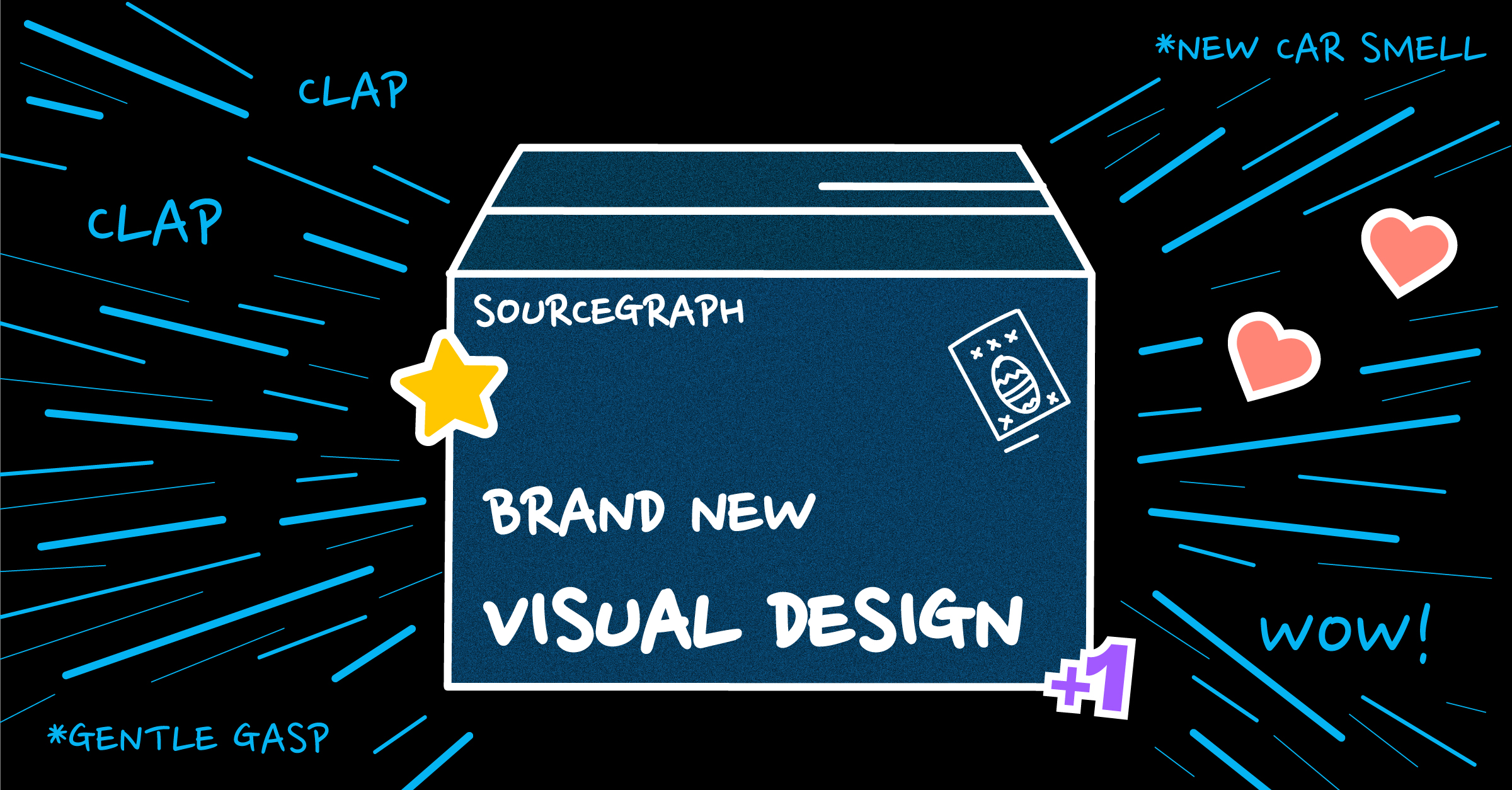
Monitoring is not enough: For high-performing development teams you need observability tools
Kevin Graham on June 5, 2021
Observability and tracking the right metrics are critical to development teams' success. We chatted to Charity Majors of Honeycomb about bridging the gap between dev and ops, and making software more comprehensible to everyone.
Read more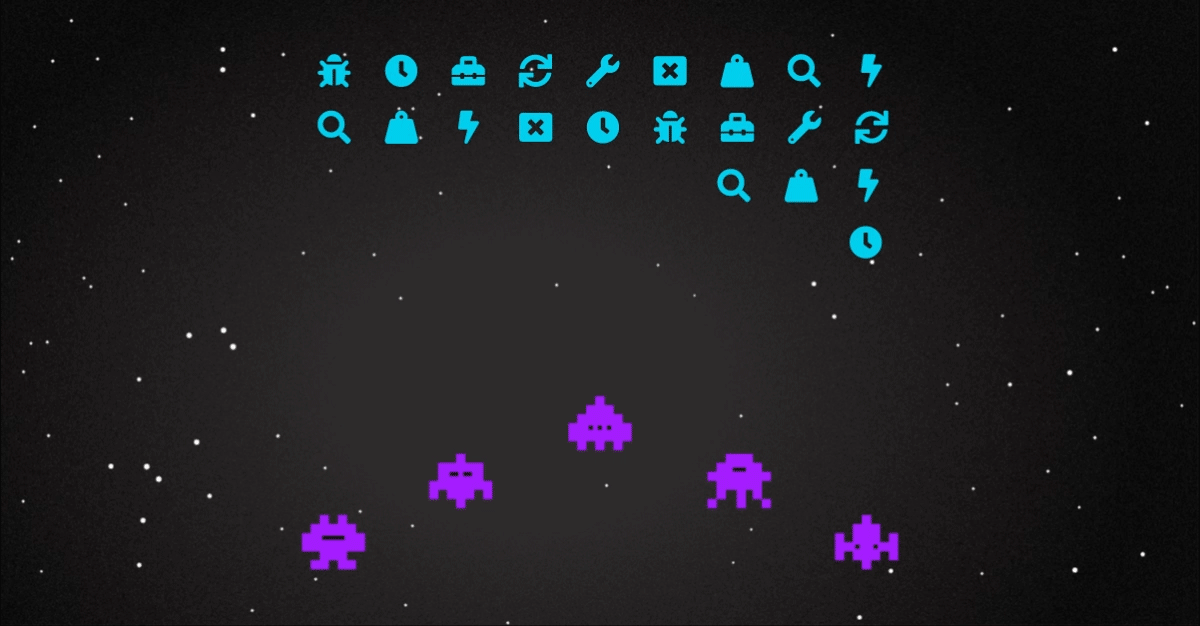
Optimizing a code intelligence commit graph (Part 2)
Eric Fritz on June 4, 2021
We enabled Sourcegraph to resolve code intelligence requests for commits missing an index, but ran into scalability challenges when dealing with large commit graphs. Here's how we unearthed and resolved the problem.
Read more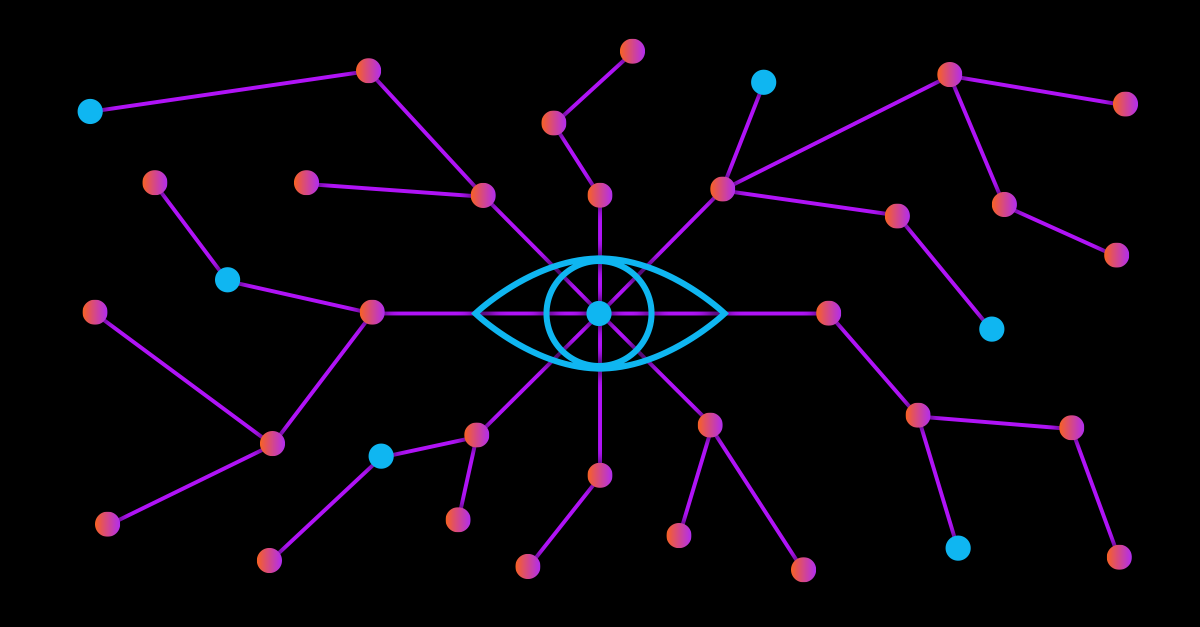
Better onboarding: Here’s how the best engineering leaders do it
Beyang Liu on May 28, 2021
Building robust software that runs at scale is a team effort. Here are 3 engineering leaders on how they use both human and automated processes to set their growing teams up for success.
Read more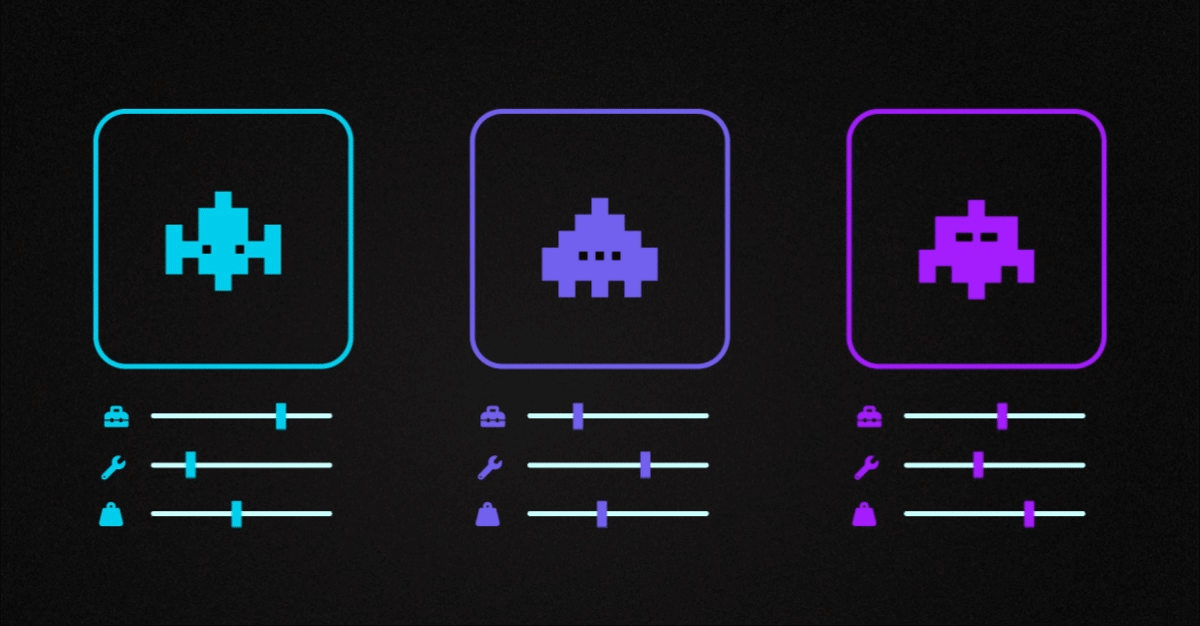
Optimizing a code intelligence commit graph (Part 1)
Eric Fritz on May 27, 2021
We enabled Sourcegraph to respond to requests for commits missing a code intelligence index quickly and with precise results. Read about our journey.
Read more
Sourcegraph 3.28 release
May 24, 2021
The Sourcegraph 3.28 release includes new security enhancements and the redesigned extensions registry.
Read moreWhen gut instinct doesn’t scale: Creating Sourcegraph’s product design principles
Quinn Keast on May 18, 2021
Here’s how our rapidly growing all-remote product and design teams collaborated asynchronously to define Sourcegraph’s inclusive product design principles to help us scale consistently.
Read more
Better onboarding: How to prevent codebase overwhelm
Patricia No on April 29, 2021
A data-driven look at how the rise in code complexity affects new developers joining a team, and how engineering managers can support new hires with better onboarding.
Read more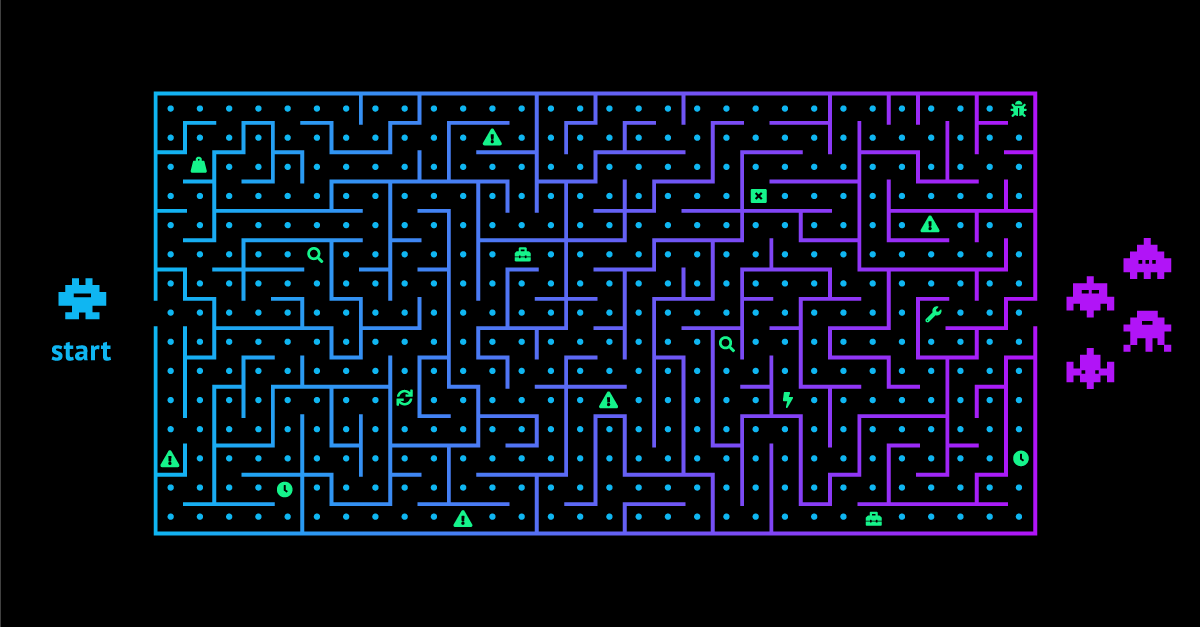
Dev Tool Time with Seth Vargo: Productivity hacks and .gitconfig tips
Vanesa Ortiz on April 28, 2021
Check out the recording of our first episode of Dev Tool Time, in which Google Cloud Engineer Seth Vargo shares his tips for a productivity-optimized desk setup, efficient window management, and keyboard shortcuts.
Read more
Sourcegraph 3.27 release
April 27, 2021
Sourcegraph 3.27 release includes Batch Changes updates, changes to the minimum required version of Postgres, and added a new seach feature.
Read moreAvoiding the pitfalls of iteration-based development, explained in 5 pull requests
Thorsten Ball on April 15, 2021
From "Automation" to "Campaigns" to "Batch Changes", this is the story of how we built (and rebuilt) our latest code search product, Batch Changes, and the lessons we learned along the way.
Read more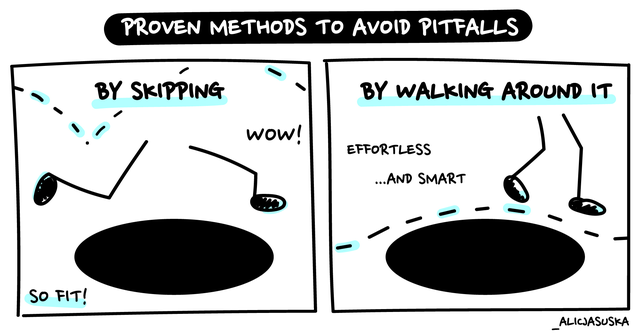
Why we're friends, not competitors, with code hosts
Quinn Slack on April 6, 2021
Some people assume that Sourcegraph competes with GitHub, GitLab, Bitbucket, and other code hosts. This is wrong! In fact, we need code hosts to exist, and code hosts benefit from the existence of a good, vendor-neutral code search tool. Here's why.
Read moreWhy we're updating the minimum supported version of Postgres
Eric Fritz on March 31, 2021
As of Sourcegraph 3.27, we're updating the minimum supported version of Postgres from 9.6 to 12. Here's why.
Read more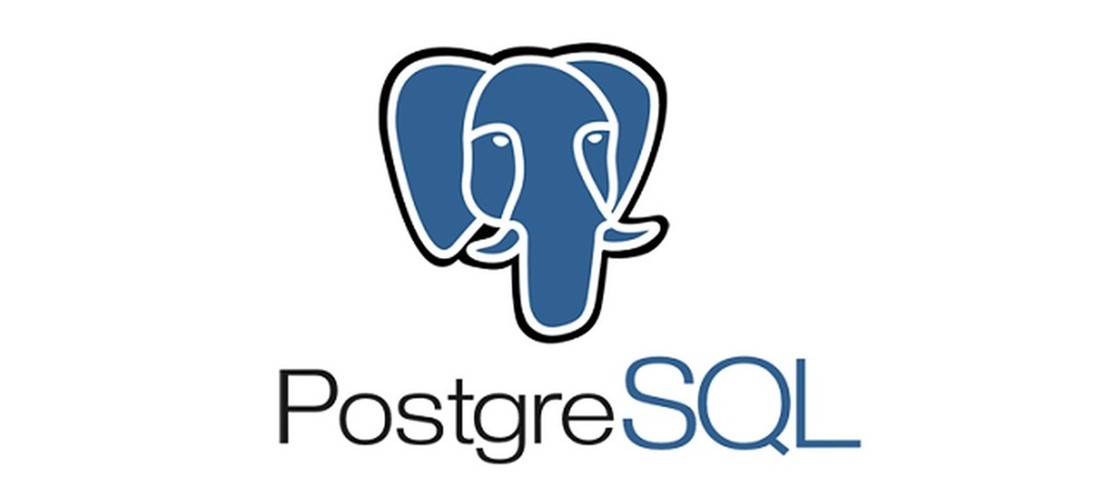
Introducing Batch Changes
Sourcegraph on March 24, 2021
Learn how to automate and track large-scale code changes across all of your repositories and code hosts with Sourcegraph Batch Changes.
Read moreSourcegraph 3.26 release
March 20, 2021
Sourcegraph 3.26 is released.
Read moreImproving code display: A look at 17 developer workspaces
Rob Rhyne on March 16, 2021
We asked 17 Sourcegraph developers about their workspace preferences. Here's what we found.
Read more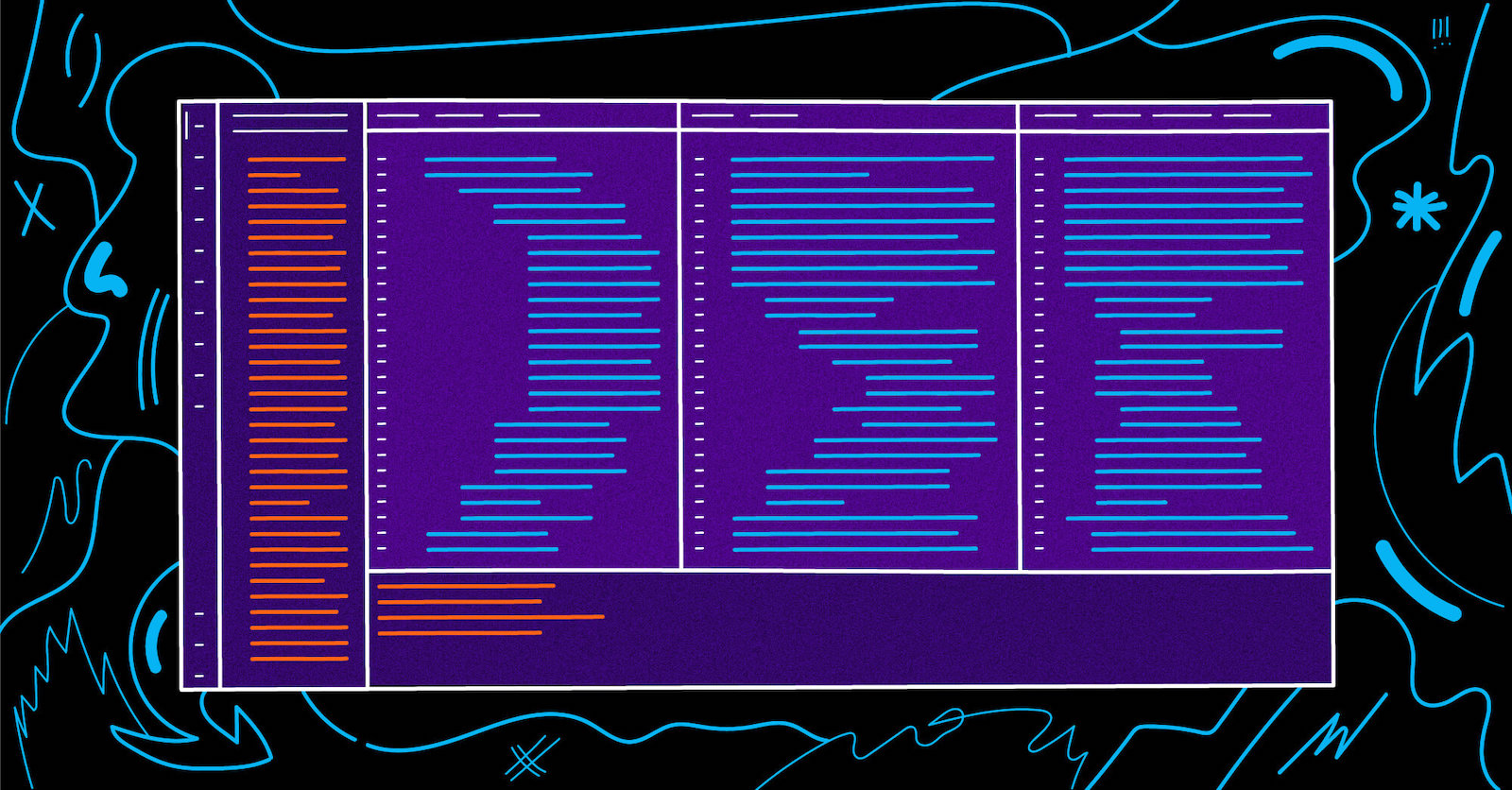
Sourcegraph 3.25 release
February 20, 2021
Sourcegraph 3.25 is released.
Read moreInteractive search mode is no longer supported
Sourcegraph on January 20, 2021
As part of our 3.24 release, interactive search mode is no longer supported. We deprecated the feature last September, and as of January 20, 2021, it has been removed for all users.
Read moreSourcegraph 3.24 release
January 20, 2021
Sourcegraph 3.24 is released.
Read moreSourcegraph 3.23 release
December 20, 2020
Sourcegraph 3.23 is released.
Read moreEpisode 16: Kelsey Hightower, Kubernetes and Google Cloud
December 16, 2020
Kelsey Hightower, Beyang Liu
As an engineer at Puppet, CoreOS, and Google Cloud, Kelsey Hightower has been at the forefront of new deployment technologies over the past decade. Along the way, he has built tools like
confd, created learning resources like Kubernetes The Hard Way, co-founded KubeCon, and taught multitudes of people about containers, infrastructure as code, service meshes, and the operating system of the cloud.In this conversation, Kelsey talks about how he learns new technologies, shares stories over the course of Kubernetes history, and explains how one might make sense of the varied ecosystem of infrastructure tools ("engineering organizations are like restaurants").
Sourcegraph raises $50M Series C round led by Sequoia
Quinn Slack on December 3, 2020
Today we're announcing Sourcegraph's $50M Series C round of funding led by Sequoia. We'll use this funding to bring universal code search to more developers and companies.
Read more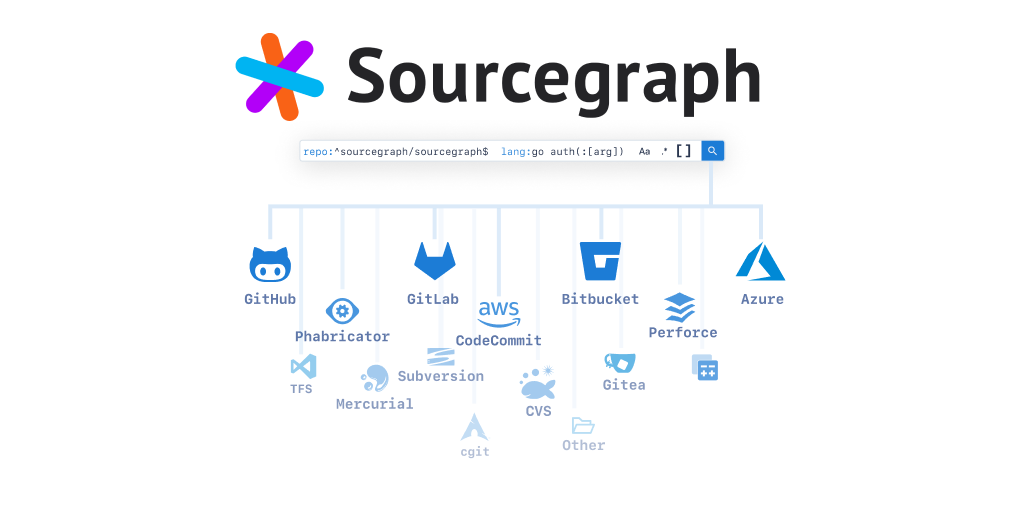
An ex-Googler's guide to dev tools
Beyang Liu on November 24, 2020
After leaving Google, many engineers miss the developer tools. Here's one ex-Googler's guide to navigating the dev tools landscape outside of Google, finding the ones that fill the gaps you're feeling, and introducing these to your new team.
Read more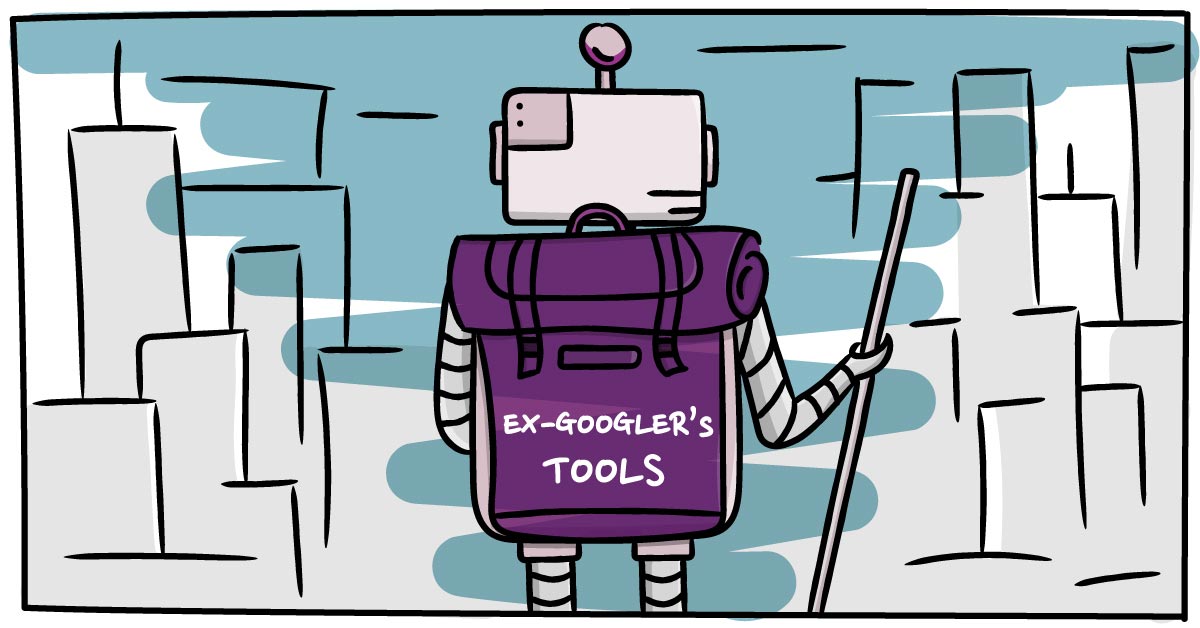
Episode 15: Peter Pezaris, CEO of Codestream
November 16, 2020
Peter Pezaris, Beyang Liu
Peter Pezaris is the CEO and founder of Codestream, an editor plugin that's bringing code discussions and communication into your IDE. Codestream is starting by bringing GitHub PRs into your editor, but it has a novel vision for knowledge sharing that goes well beyond that. We talk about that vision, the shortcomings of existing communication tools for developers, and the challenges of building a uniform user experience on top of multiple editor APIs.
Why code search is still needed for monorepos.
We asked developers with monorepos why they use code search—then compiled the most convincing reasons.
Episode 14: Jonathan Carter (LostInTangent), Visual Studio Live Share, GitHub Codespaces, CodeTour
November 9, 2020
Jonathan Carter, Beyang Liu
Jonathan Carter (a.k.a. LostInTangent) is the principal program manager at Microsoft for VS Code Liveshare, GitHub Codespaces, and IntelliCode. We talk about how Liveshare is opening up new possibilities in pair programming, how Codespaces aims to reduce a key source of developer friction, and how he and his team want to enable more developers to say "yes" to the question, "Why not now?" Jonathan also talks about building dev tools in his spare time, including his latest project, CodeTour, a VS Code extension that lets you create guided tours through your codebase.
Episode 13: Andrew Gallant (BurntSushi), creator of ripgrep
November 2, 2020
Andrew Gallant, Beyang Liu
Andrew Gallant (a.k.a. BurntSushi) is the creator of ripgrep, a popular command-line search tool that powers the search box in VS Code. Andrew tells me how ripgrep began, explains why it's faster than GNU grep and other grep alternatives, and gets into the nitty-gritty of regex optimization.
We also discuss another matter near and dear to both of us: Linux window management. Andrew talks about what he likes about Go and Haskell and why Rust is his current go-to programming language, and finally he shares a humorous anecdote involving algorithms, technical recruiting, and everyone's favorite New England sports team.
Can you hear me? No, but we read you—an experiment with video calls
Quinn Keast on October 29, 2020
This article originally appeared on Fast Company. At Sourcegraph, we’re all-remote. That means we write a lot—in emails, Google Docs, Github, and Slack. We work hard to cultivate a written-first culture. And that works beautifully for me. Because, you see, I have a hearing problem. Or as I like to…
Read more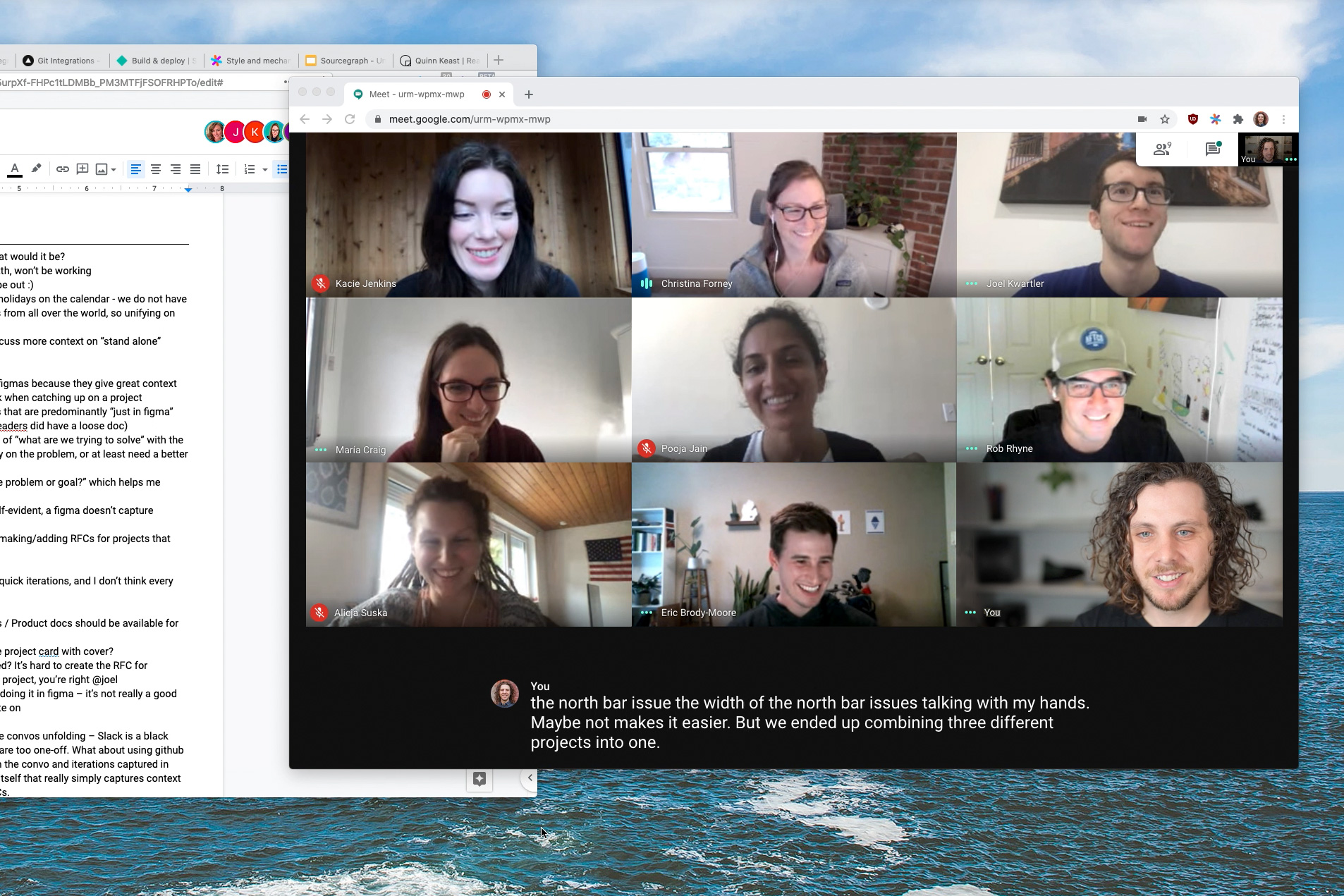
Improving security through real transparency
Chayim Kirshen on October 20, 2020
One of the things that comes with being an open source company is a commitment to transparency. As an industry, we mostly think about this in terms of source code, and at Sourcegraph we think of this in terms of the company itself, including product direction. I’d like to extend that to security…
Read more
Code search turned code checker
Rijnard van Tonder on October 19, 2020
I find code checkers like linters and lightweight static analyzers most valuable when they teach me better ways to code in a language or framework. For example, the Go staticcheck tool finds expensive string comparisons like: and suggests instead: These short-and-sweet replacements are a great way…
Read more
Episode 12: Syrus Akbary, founder and CEO of Wasmer
October 12, 2020
Syrus Akbary, Beyang Liu
Syrus Akbary is the founder and CEO of Wasmer, the startup behind the open-source web assembly runtime that's doing for WebAssembly what Docker did for LXC. Syrus explains what WebAssembly is, why it matters outside your browser, and how it compares to other virtualization technologies. He shares the pains that motivated him to look into WebAssembly and eventually led him to create a new WebAssembly runtime and a new company around it. We dive deep into WebAssembly as a technology, its portability and performance characteristics, and talk about the importance of prioritizing community and developer experience when building new development platforms.
A different way to think about code ownership
Nick Snyder on October 5, 2020
We’re experimenting with a new way to think about code ownership, and have built a new tool called Codenotify. Codenotify enables developers to easily subscribe to file changes in a Git repository without creating the expectation that changes to those files are blocked on the subscriber’s review…
Read more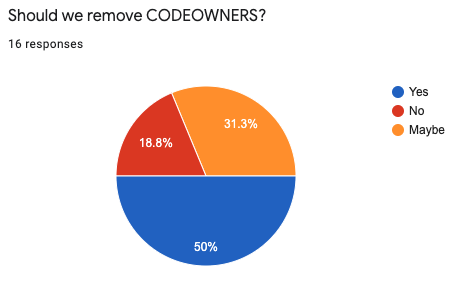
Software engineer career paths
Chris Pine on September 30, 2020
When I first began my career as a software engineer, I thought I knew where I wanted to go (become a Senior Software Engineer) and how to get there (write better code faster). I was wrong on both accounts. First, by focusing on a generic career ladder instead of my individual career path, I was…
Read more
Sourcegraph 3.20 release
September 20, 2020
Sourcegraph 3.20 is released.
Read moreWhat happens when a successful product gets its first design team...
Alicja Suska on September 17, 2020
We are happy to announce that the Sourcegraph design team has grown from 0 to 3! 🎉 The early stages of a new team are full of changes and unexpected challenges. I would like to show you what our first months of working together looked like, what we have accomplished, and our plans for the future…
Read more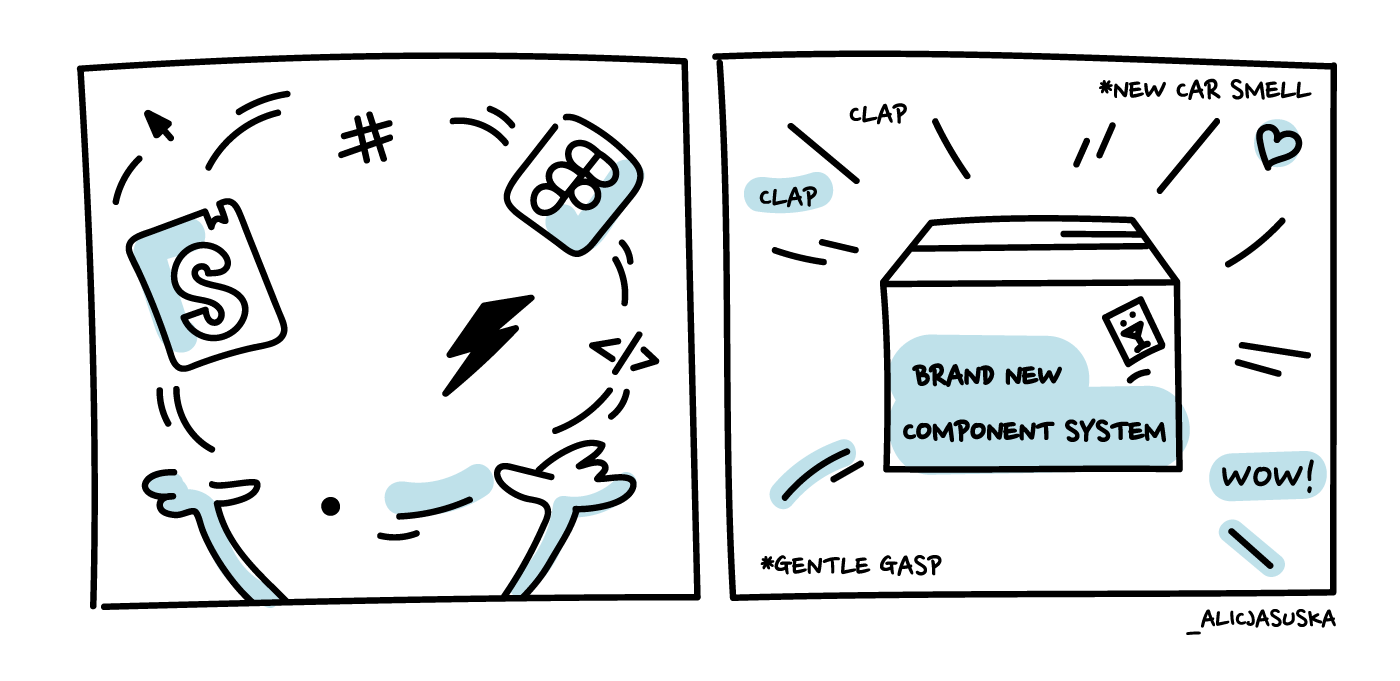
Episode 11: Michael Stapelberg, creator of i3, Debian Code Search, and distri
September 7, 2020
Michael Stapelberg, Beyang Liu, Thorsten Ball
Michael Stapelberg shares with us a multitude of experiences and contributions across the Go and Linux open-source communities. Highlights include creating the popular window manager i3, building Debian Code Search, and researching fast package management for Linux with distri. Thorsten Ball, author of Writing a Compiler in Go and Writing an Interpreter in Go, joins. The three of us talk about the importance of developer experience to open-source communities, how code search changes how you work, and how to decide when to build something new.
Optimizing a code intelligence indexer
Eric Fritz on September 7, 2020
We (Sourcegraph's code intelligence team) recently made Go code intelligence faster, especially on very large repositories. For example, we cut the indexing time by 95% for the huge Go AWS SDK repository, from 8 minutes to 24 seconds. Here's how we did it. Background: what is code intelligence…
Read more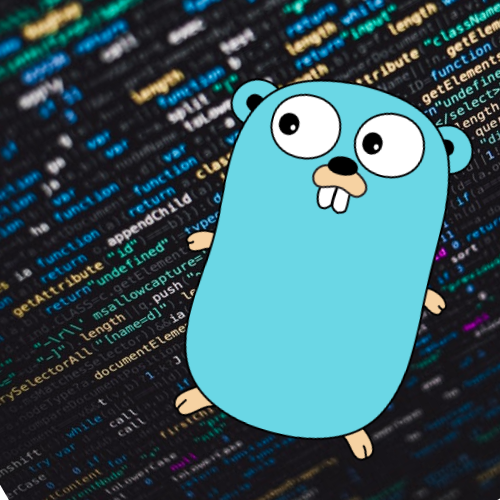
Episode 10: Matt Holt, creator of Caddy
August 31, 2020
Matt Holt, Beyang Liu
Matt Holt is the author of many popular projects in the Go open-source world, among them the popular Caddy web server, which pioneered support for HTTP/2 and might still be the only major web server to support automatic TLS by default.
Matt talks about his motivations for creating Caddy, how the project grew and evolved over time, what it was like to do a complete rewrite from Caddy v1 to v2, and the challenges of maintaining a very popular open-source project. He also talks about his latest project, a TCP multiplexer called Project Conncept.
Search code quickly by going to
cs.dev/QUERY.We made the https://cs.dev shortcut URL service so that you can jump to code search faster. Try typing these into your browser's URL bar:
cs.dev/NewScannercs.dev/repo:sourcegraph f:Dockerfile ca-certcs.dev/lang:python import yamlEpisode 9: Thorsten Klein, creator of k3d
August 24, 2020
Thorsten Klein, Dax McDonald, Beyang Liu
Thorsten Klein is the creator of k3d, a tool that lets you run a lightweight Kubernetes cluster (k3s) inside a single Docker container. This makes it much easier to spin up a Kubernetes cluster in places like your dev environment, your CI pipeline, or a low-resource environment like a Raspberry Pi.
Thorsten is a DevOps engineer at Trivago, where he works on developer experience for a team that maintains a set of bare-metal Kubernetes clusters. Dax McDonald, former engineer at Rancher Labs, joins. We chat about the ways in which developers are using k3d, the motivations and inspirations for writing it, and other tools we find useful in the Kubernetes ecosystem.
Sourcegraph 3.19 release
August 20, 2020
Sourcegraph 3.19 is released.
Read moreEpisode 8: Rijnard van Tonder, creator of Comby
August 4, 2020
Rijnard van Tonder, Beyang Liu
Rijnard van Tonder is the creator of Comby, a pattern-matching syntax and command-line tool that offers a more expressive and more user-friendly alternative to regular expressions for many common patterns in code.
Rijnard earned his PhD from Carnegie Mellon University in 2019. In this podcast, we chat about the state of the art in static analysis and automated bug-fixing, new tools made in industry like Pyre and SapFix, and what place machine learning has in the world of developer tools.
Episode 7: Dan Bentley, CEO and co-founder of Tilt
July 27, 2020
Dan Bentley, Beyang Liu
Dan Bentley is the CEO and co-founder of Tilt, a company that's bringing order back to the dev environment in the age of microservices and Kubernetes. It features smart rebuilds, live updates, an easy-to-use CLI, and a beautiful GUI dashboard for staying on top of what's happening in your multi-service dev environment.
Prior to founding Tilt, Dan was the first full-time dev tools engineer at Google, where he worked on a variety of developer tools and infrastructure over his 11-year stint. We talk about what Google was like just before the IPO, the features he misses from Google Code, and several projects he worked on, among them a precursor to Google's famed Blaze (open-sourced now as Bazel) build system.
Episode 6: Yves Junqueira and John Ewart, co-founders of YourBase
July 20, 2020
Yves Junqueira, John Ewart, Beyang Liu
Yves Junqeira and John Ewart are co-founders of YourBase, a build and test runner service that accelerates testing and CI by understanding the implicit dependency graph of your builds. YourBase integrates with most major build tools and employs system call analysis and static language analysis to infer the build dependency structure without the need for manual configuration. It then uses this information to parallelize and cache builds, yielding significant performance improvements.
Yves and John reflect on their experiences working as SRE inside Google and SWE inside Amazon and how writing code is different inside these organizations, both compared to one another and to the rest of the world. They share lessons learned and advice for potential developer tool founders.
Sourcegraph 3.18: Multi-revision search, custom search pages, campaigns for GitLab, better C++, and more
Laureen Hudson on July 20, 2020
Our team has been hard at work continuing to improve Sourcegraph, so you can spend more time coding and less time trying to make sense of things. Sourcegraph 3.18 brings a solid lineup of new features and enhancements, including searching across multiple revisions at a time, GitLab support in…
Read more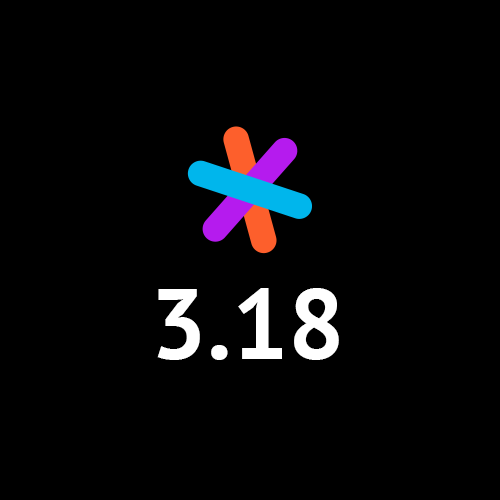
Search across multiple revisions of the same repository
Keegan Carruthers-Smith on July 20, 2020
Often, you need to understand the differences between code at different branches (especially for release branches that have diverged). In Sourcegraph 3.18, you can now search across multiple revisions of the same repository by listing multiple branch names (or other revision specifiers) separated...
Read more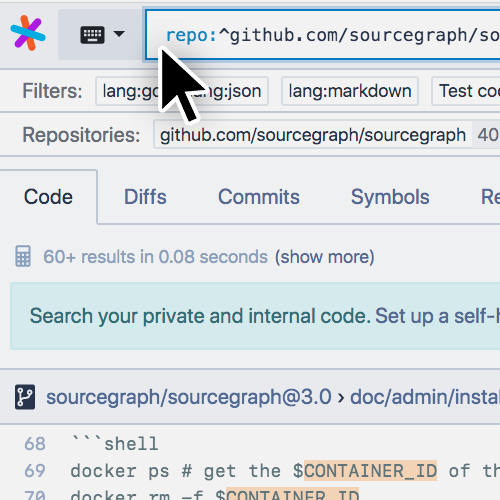
Indexed non-default branches
Keegan Carruthers-Smith on July 20, 2020
Developers on some teams frequently search multiple revisions, such as long-lived release branches or important tags. We added version contexts in Sourcegraph 3.16 to make it easier for developers to search a collection of repositories at specified revisions. However, Sourcegraph still only indexed…
Read more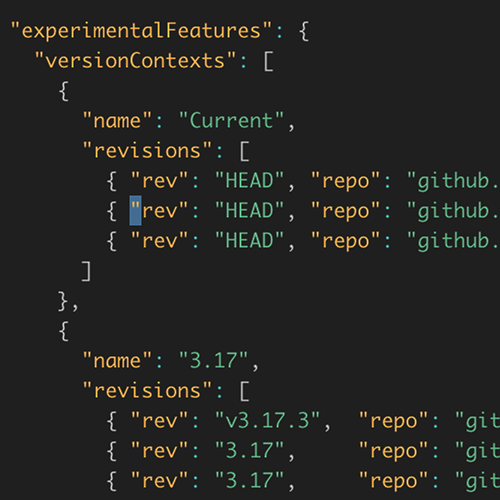
Better C++ precise code intelligence
Roux on July 20, 2020
As part of our ongoing effort to extend precise code intelligence to as many languages as possible, we’ve developed lsif-clang, a new LSIF indexer based on the clangd language server. This means that customers using C and C++ now have access to precise code intelligence. This improves on the work...
Read more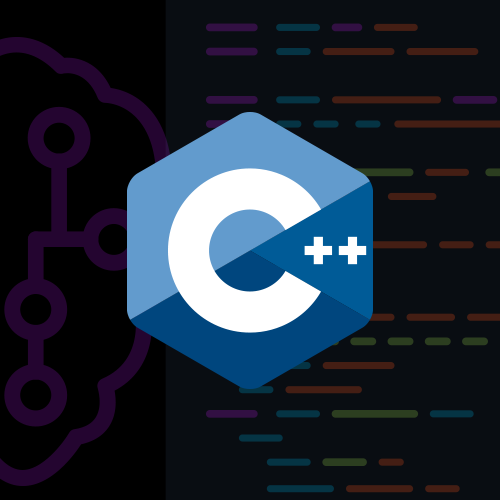
Getting notified about the health of Sourcegraph is now easier
Robert Lin on July 20, 2020
We continue to make improvements to Sourcegraph’s out-of-the-box instrumentation and monitoring. You can now configure critical alerts to go to Slack, PagerDuty, Opsgenie, webhooks, or email, so it's easier than ever before to get notified about critical issues. Alerts are now delivered with…
Read more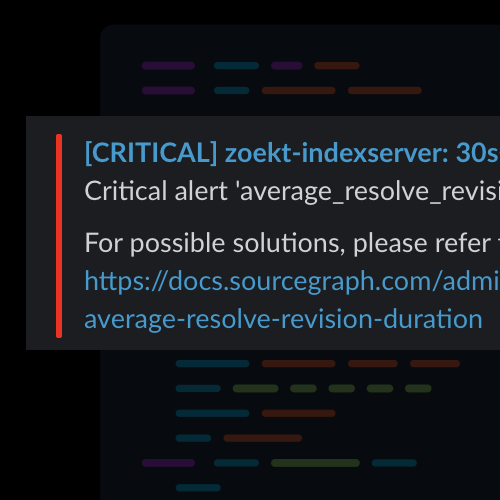
Custom search pages on Sourcegraph Cloud
Farhan Attamimi on July 20, 2020
Sourcegraph.com now has custom search pages for major open source communities. These pages provide targeted documentation with suggested queries specifically for users and contributors in each community, and searches are scoped by default to repositories relevant to that community. This is a great…
Read more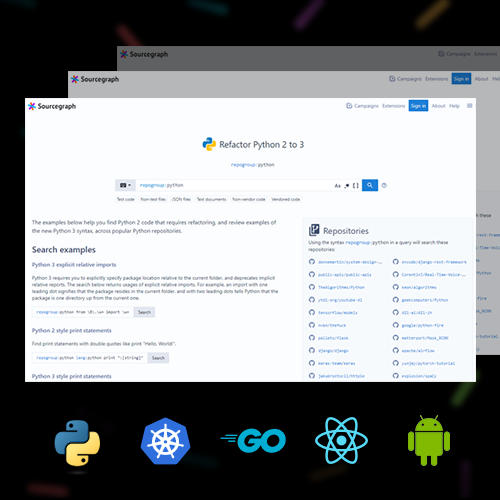
Small but useful improvements
Loïc Guychard, Adam Harvey, Eric Fritz on July 20, 2020
We've improved in-product documentation to clarify how Sourcegraph fetches data from code hosts. We heard from some first-time users that they were uncertain about how Sourcegraph would use access tokens and how much additional load Sourcegraph would put on code host servers. The new docs make it…
Read more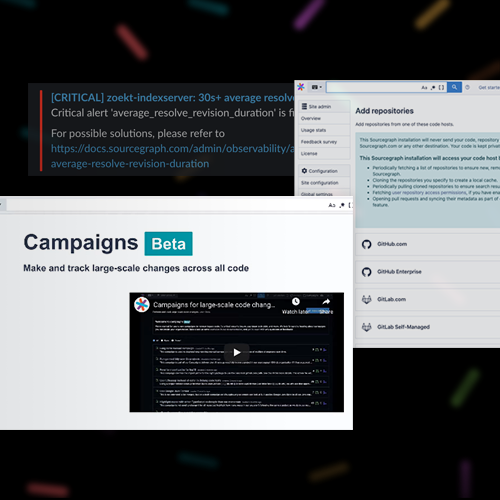
Felicis helping us grow universal code search faster
Quinn Slack on July 14, 2020
Felicis Ventures has invested an additional $5M in Sourcegraph, bringing our total raised to over $46M, including our $23M Series B in March 2020 led by Craft Ventures. We're seeing rapid growth in the number of companies and developers using Sourcegraph, especially as the pandemic causes dev teams…
Read more
Episode 5: Luke Hoban, CTO of Pulumi, co-founder of TypeScript
July 13, 2020
Luke Hoban, Beyang Liu
If you write code on the modern web, it's almost certain that your life has been shaped significantly by Luke Hoban's work. Luke has worked on developer tools his entire career. He started out on Visual Studio, C#, and .NET in the early 2000s, later joined the ECMAScript standards body as a representative of Microsoft, and then became one of the co-founders of the TypeScript programming language. Today, he is the CTO of Pulumi, an infrastructure-as-code company that lets you write your deployment config as code in your favorite language.
Luke shares stories from the early days of TypeScript and talks about how it evolved from a two-man team to one of the most successful programming languages and open-source projects. We discuss important inflection points and design decisions that played a key role in TypeScript's runaway success. We also dive into the symbiotic relationship that TypeScript had with another early project just getting off the ground at the time: VS Code. Luke also shares his learnings from his stint at AWS, how his role at Pulumi combines his two passions for programming languages and cloud infrastructure, and how Pulumi brings the niceties of the IDE experience to an area that sorely needs it—infrastructure configuration management.
Episode 4: Evan Culver, developer tools at Segment
July 6, 2020
Evan Culver, Beyang Liu
Evan Culver builds developer tools at Segment, a customer data platform that lets product managers and software teams understand their users through data.
Evan's career has spanned many years up and down the software stack, from frontend UI development to infrastructure and ops. For the past five years, his focus has been developer tooling and infrastructure, having worked on these during his tenure at Uber during its hypergrowth years and now on the dev tools team at Segment, where his charter is to "empower the engineers of Segment with the tools to automate, optimize, and streamline their workflows." In this episode, he explains to Beyang what exactly that means, discussing Segment's use of technologies from the AWS ecosystem, the popular open-source secret management tool they created, ChatOps, and various Docker- and Kubernetes-based tools that are useful for managing the deployment of many microservices.
Episode 3: Charity Majors, founder and CTO of Honeycomb
June 29, 2020
Charity Majors, Beyang Liu
Charity Majors is the founder and CTO of Honeycomb, provider of observability tooling for modern engineering teams to build resilient production software that delights customers and reduces toil. Charity tells Beyang about how Honeycomb derives its definition of observability for software systems from its original definition in control theory, and how observability differs from monitoring and logging. She shares war stories from her time keeping systems online at Facebook and Parse, gives her predictions about how the landscape of observability and monitoring tools will evolve, and discusses how developer tools can make programming more accessible to everyone.
Episode 2: Ryan Djurovich, DevOps and DevTools manager at Xero and Cloudflare
June 22, 2020
Ryan Djurovich, Quinn Slack
Ryan Djurovich is a DevOps manager at Xero and former manager of the DevTools team at Cloudflare. He shares with Quinn how he has seen the landscape of Continuous Integration and Delivery (CI/CD) tools change over the years, the three waves of CI/CD, and where he thinks testing and build tools are headed in the future.
Sourcegraph 3.17: Faster and automatic precise code intelligence, preview of code insights, and AND/OR queries for searching file contents
Adam Herzog on June 20, 2020
Sourcegraph 3.17: Faster and automatic precise code intelligence, preview of code insights, and AND/OR queries for searching file contents
Read more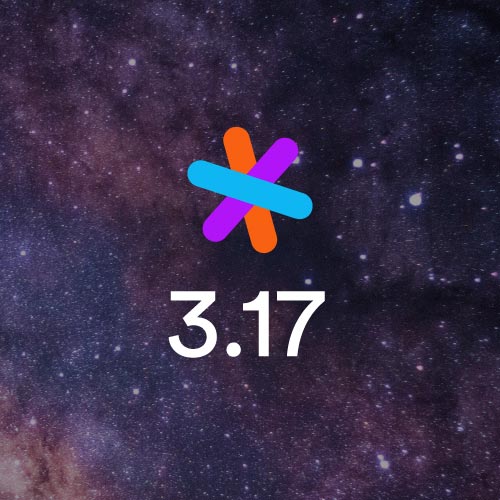
Optimizing a code intelligence backend
Eric Fritz on June 17, 2020
Read about how we used a memory and CPU profiler, creative thinking, and a lot of developer elbow grease to optimize our semantic code indexing system to give users twice-as-fast tooltips, go-to-definition, and references.
Read more
The Language Server Index Format (LSIF) at Sourcegraph, a year in review
Eric Fritz on June 17, 2020
We've spent a year building out the world's largest semantic code index using the Language Server Index Format (LSIF). Read about the technical journey, from MVP to scaling and optimizing the system to support large-scale codebases.
Read more
Episode 1: David Cramer, creator of Sentry
June 15, 2020
David Cramer, Beyang Liu
David Cramer talks about creating Sentry as an open-source side project, maintaining it while working full-time at Dropbox, and ultimately growing it into today's leading application monitoring tool. We chat about the emergence of new computing platforms, his thoughts on what's truly new and what's just marketing-speak for old ideas, and how he sees the landscape of monitoring evolving in the future.
Introducing the Sourcegraph Podcast
June 1, 2020
Beyang Liu
Welcome to the Sourcegraph Podcast, a new show about developer tools and their creators. Over the next couple of weeks, we'll be publishing conversations with people we think are some of the best and brightest minds working on tools and infrastructure for developers. Here's a partial lineup:
- David Cramer, co-founder and CTO of Sentry, formerly SWE at Dropbox
- Luke Hoban, co-founder and CTO of Pulumi, co-founder of TypeScript, formerly program manager at Microsoft
- Ryan Djurovich, dev tools and DevOps leader at Xero, formerly Cloudflare
- Charity Majors, co-founder and CTO of Honeycomb, formerly infrastructure tech lead at Parse and Facebook
- Evan Culver, dev tools and infrastructure leader at Segment, formerly Uber
- Rijnard van Tonder, creator of Comby, formerly PhD researcher at CMU with stints at Microsoft Research and Facebook, now at Sourcegraph
- Yves Junqueira, co-founder and CEO of YourBase, formerly SRE at Google
- John Ewart, co-founder and CTO of YourBase, formerly SWE at Amazon
- Dan Bentley, founder and CEO of Tilt, formerly SWE at Google
- Thorsten Klein, creator of k3d, DevOps engineer at trivago
If you have ideas or suggestions for guests, hit us up on Twitter. We're speaking to an audience of developers who love leveling up their productivity and, perhaps, who also aspire to create great dev tools themselves. If that's you, then subscribe! We look forward to sharing some insightful conversations with you over the next few weeks.
Sourcegraph 3.16: Search past releases, get started with campaigns, and enjoy syntax highlighting improvements
Christina Forney on May 20, 2020
Sourcegraph 3.16: Search past releases, get started with campaigns, and enjoy syntax highlighting improvements
Read more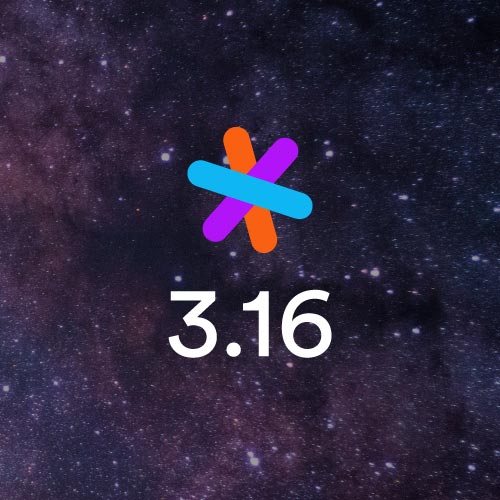
The find-and-replace Odyssey, a programmer's guide
Beyang Liu on May 15, 2020
So much of what we do as programmers boils down to automating the tedium out of our work. We'd like to spend our lives focusing on the design of beautiful abstractions and algorithms, but before we can get to that, we have to do the dirty work—and do it quickly. Whether you are a newbie or a…
Read more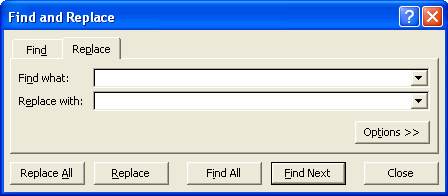
Our ABCs: Always Be Coding children's book free to download
Ryan Blunden on April 23, 2020
With many family homes now being an office (and perhaps a school as well), we wanted a new and novel approach for embracing the spirit of the United States' annual "Take Our Kids to Work" day. We love what we’ve come up with and hope you will too—a new digital children’s book titled "Our ABCs…
Read more
Sourcegraph 3.15: Campaigns beta available, GitHub repository permissions, experimental AND/OR operators, and improved observability
Christina Forney on April 20, 2020
Sourcegraph 3.15: Campaigns beta available, GitHub repository permissions, experimental AND/OR operators, and improved observability
Read more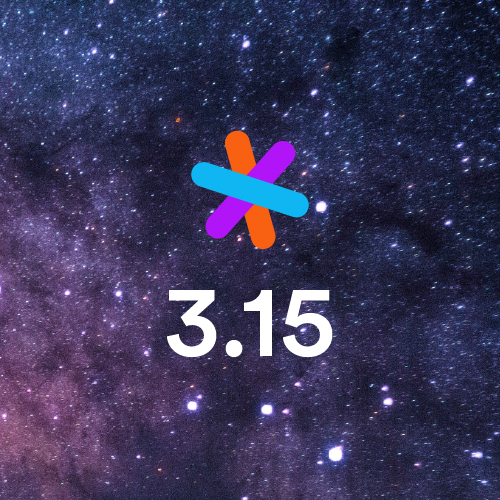
Remote software development made easier
Stephen Gutekanst and Vanesa Ortiz on April 14, 2020
Sourcegraph transitioned from remote-first to all-remote early 2020. In this white paper, we share some tips and tricks on how to live your best distributed work life and a summary of why using Sourcegraph makes remote software development easier.
Read more
Code intelligence on sourcegraph.com
Michael Fromberger on April 14, 2020
At Sourcegraph we are working toward a long term goal of making code intelligence results both fast and precise. Today, Sourcegraph provides basic code intelligence for many languages using our search engine. It's fast, requires zero configuration, and covers many use cases, but the results are not…
Read more
Universal Code Intelligence for GitHub with the Sourcegraph browser extension
Ryan Blunden on April 7, 2020
Universal Code Intelligence for GitHub means bringing code navigation features such as hover tooltips, go to definition, and find references to every code view and pull request, supporting every popular language, and all public and private repositories on both GitHub.com and GitHub Enterprise.
Read moreOur journey to all-remote
Nick Snyder on March 31, 2020
On February 20, 2020, we officially moved out of our amazing San Francisco office and became an all-remote company. Few people have worked at an all-remote company before, and I frequently get questions—especially from candidates—about what led to this decision.
Read more
The home offices of Sourcegraph
Thorsten Ball on March 27, 2020
I'm always curious to see other people's desks (who isn't?) to get a glimpse of their setup, and after seeing the home office desks of Basecamp, I immediately wanted to have the same collection for Sourcegraph. As an all-remote company, we only have home office setups and they range from "sparse"...
Read more
Enable native code intelligence for GitLab with the Sourcegraph integration
Ryan Blunden on March 23, 2020
With the GitLab native code intelligence integration from Sourcegraph, you can bring IDE-like features such as hover tooltips and go to definition to every GitLab code view. The below screencasts show you how to enable the Sourcegraph integration for both GitLab CE/EE and GitLab.com. Native code…
Read more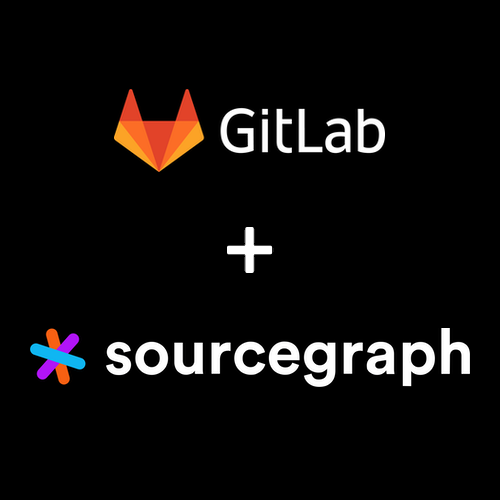
Sourcegraph 3.14: Faster repository permissions, excluding forks and archived repositories by default, and Docker Compose deployment
Christina Forney on March 20, 2020
Sourcegraph 3.14: Faster repository permissions, excluding forks and archived repositories by default, and Docker Compose deployment
Read more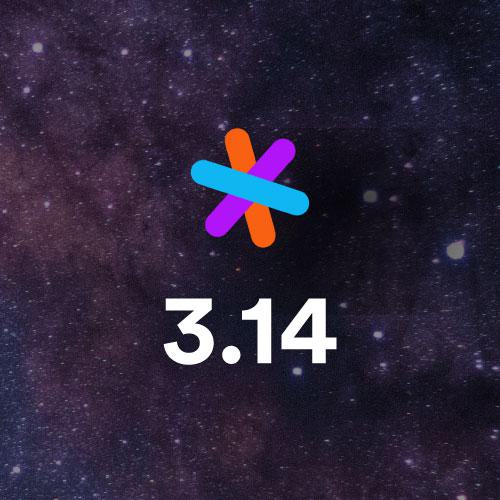
Universal Code Search for GitLab
Ryan Blunden on March 12, 2020
Universal Code Search for GitLab
Read moreUniversal Code Search for GitHub
Ryan Blunden on March 11, 2020
Universal Code Search for GitHub
Read moreSourcegraph's Series B: Universal Code Search for every developer
Quinn Slack on March 3, 2020
Today is a big milestone for Sourcegraph. We've raised $23M in Series B funding, led by David Sacks at Craft Ventures. Our existing investors at Goldcrest, Redpoint, Hanover, and Burst also participated. We're excited to welcome David Sacks of Craft Ventures to our board of directors. David helped…
Read more
Sourcegraph 3.13: Interactive search mode, structural search toggle, and campaigns with custom code execution
Christina Forney on February 20, 2020
Sourcegraph 3.13: Interactive search mode, structural search toggle, and campaigns with custom code execution
Read more
Going beyond regular expressions with structural code search
Rijnard van Tonder on February 12, 2020
We're introducing a new way to search code at Sourcegraph with structural code search. Structural code search lets you match nested expressions and whole code blocks that can be difficult or awkward to match using regular expressions. What is structural code search? Structural code search is the…
Read more
Sourcegraph 3.12: Match case toggle, draft campaigns, and exciting experimental features
Christina Forney on January 20, 2020
Sourcegraph 3.12: Match case toggle, draft campaigns, and exciting experimental features
Read more
Sourcegraph 3.11: Structural search, removed management console, language statistics, and NPM credentials campaign
Christina Forney on December 20, 2019
Sourcegraph 3.11: Structural search, removed management console, language statistics, and NPM credentials campaign
Read more
Fully type-safe Web Workers with zero boilerplate
Felix Becker on December 18, 2019
TypeScript and ECMAScript have some of the most beautiful constructs and syntaxes to do parallel, non-blocking programming—but unfortunately, only for standard APIs like fetch in the browser or file IO in Node. When implementing anything CPU-bound in TypeScript, offloading it into a different…
Read more
How Sourcegraph helped ensure production stability at Lyft during their monolith to microservices decomposition
Ryan Blunden on December 13, 2019
Learn how Sourcegraph code search helped Lyft ensure (largely) issue-free production deploys during their monolith to microservices decomposition
Read more
Code navigation in GitHub pull requests
Quinn Slack on December 9, 2019
Code navigation helps you review code in GitHub pull requests more quickly and effectively. Hovers show you documentation and type information for symbols. Go to definition jumps you to where a function (or other symbol) is defined. Find references lists everywhere a function (or other symbol) is…
Read more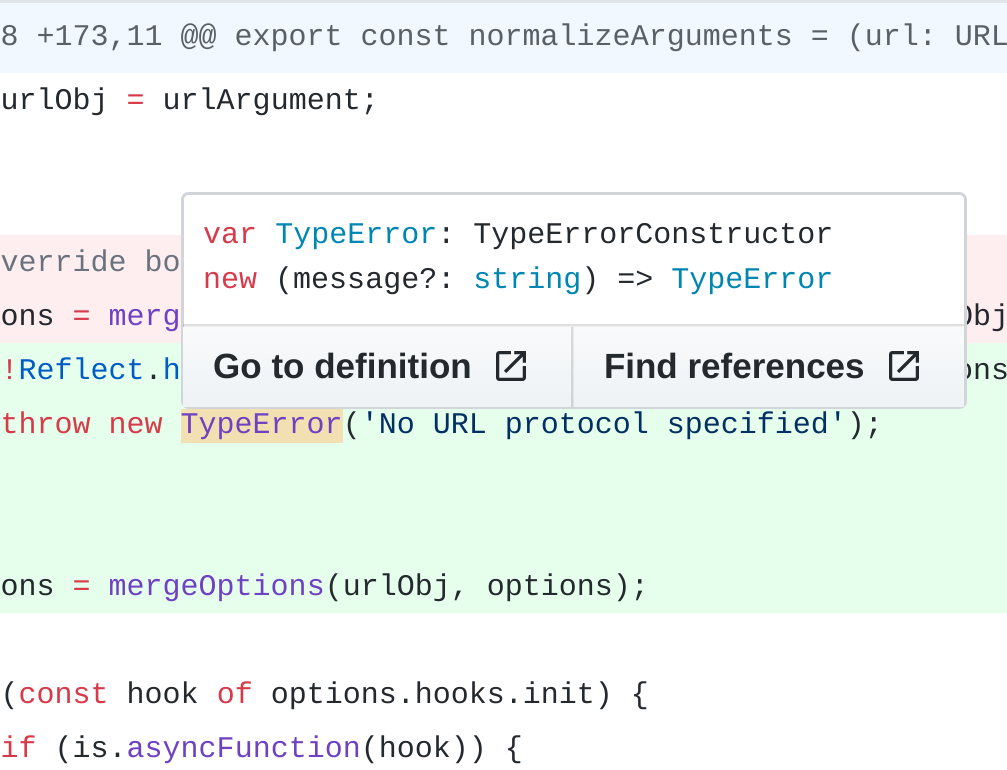
SoFi moves fast on hundreds of microservices with Sourcegraph
Vanesa Ortiz on November 21, 2019
Sourcegraph enables SoFi to innovate and move quickly while ensuring production stability for hundreds of microservices.
Read more
Sourcegraph 3.10: Improved search autocompletion, native GitLab integration, and search and replace campaigns
Christina Forney on November 20, 2019
Sourcegraph 3.10: Improved search autocompletion, native GitLab integration, and search and replace campaigns
Read more
GitLab integrates Sourcegraph code navigation and code intelligence
Christina Forney on November 12, 2019
Check out the below video where Quinn sat down with GitLab CEO Sid Sijbrandij to discuss the native GitLab integration, and why Sourcegraph's code intelligence means better code reviews and improved code quality for GitLab Enterprise customers and open source projects on GitLab.com. Over 100,00…
Read more
Convoy improved their developer on-boarding with Sourcegraph
Vanesa Ortiz on November 8, 2019
Since 2015, Convoy has quickly grown to over 500 employees. Sourcegraph helps them improve their developer on-boarding process.
Read more
At Convoy, Software Engineers and Data Scientists work better together
Vanesa Ortiz on November 8, 2019
At Convoy, Sourcegraph is transforming how engineers and data scientists collaborate, resulting in greater efficiency and improved data integrity.
Read more
Why Sourcegraph switched from cloud SaaS to on-premises, self-hosted software
Vanesa Ortiz on October 30, 2019
“Trust is great. Control is better.” - German proverb In December 2017, Sourcegraph went from being a traditional cloud-hosted Software as a Service (SaaS) product to an on-premises, self-hosted product. This blog post covers what drove our decision and what challenges we encountered. It explains…
Read more
Sourcegraph 3.9: Literal search by default, multi-project LSIF code intelligence, Grafana dashboards, and configuration
Quinn Slack on October 20, 2019
Sourcegraph 3.9: Literal search by default, multi-project LSIF code intelligence, Grafana dashboards, and configuration
Read more
Writing an LSIF Indexer
Uwe Hoffmann on October 14, 2019
Writing an LSIF Indexer
Read more
Sourcegraph 3.8: Search UI improvements, monitoring tools, code change campaigns, and LSIF-based code intelligence
Christina Forney on September 20, 2019
Sourcegraph 3.8: Search UI improvements, monitoring tools, code change campaigns, and LSIF-based code intelligence
Read more
Sourcegraph liveblogging the 2019 Strange Loop conference
Ryan Blunden on September 2, 2019
Sourcegraph is proud to be hosting the first ever liveblog for Strange Loop 2019, and we're looking for attendees to help contribute.
Read more
How Sourcegraph code search enabled large scale refactoring at Quantcast
Ryan Blunden on August 23, 2019
Founded in 2006, Quantcast's engineering team had amassed thousands of repositories. Learn how after deploying Sourcegraph, Quantcast was able to do major refactors with confidence.
Read more
Sourcegraph 3.7: Improved performance, efficiency, accuracy, and reliability
Christina Forney on August 20, 2019
Sourcegraph 3.7: Improved performance, efficiency, accuracy, and reliability
Read more
Sourcegraph 3.6: Bitbucket Server plugin, search performance improvements, and quick links
Christina Forney on July 20, 2019
Sourcegraph 3.6: Bitbucket Server plugin, search performance improvements, and quick links
Read more
How Thorn sunsets legacy applications safely with Sourcegraph
Ryan Blunden on July 8, 2019
Thorn builds technology to defend children from sexual abuse, helping law enforcement reduce investigation times by 60%, ensuring that more children are found, faster. Sourcegraph is helping Thorn with their mission, by making it safer to deprecate legacy applications—searching all repositories i...
Read more
Sourcegraph 3.5: Powerful new search filters, improved configuration, and Bitbucket Server repository permissions
Ryan Blunden and Christina Forney on June 20, 2019
Sourcegraph 3.5: Powerful new search filters, improved configuration, and Bitbucket Server repository permissions
Read more
Sourcegraph 3.4: Performance and configuration enhancements for managing 30,000+ repositories
Ryan Blunden and Christina Forney on May 20, 2019
Sourcegraph is the standard developer platform for code search and navigation at many of the largest and most exacting technology companies. With Sourcegraph, every company can get access to the same kind of tools that Google and Facebook developers use every day. We're excited to announce…
Read more
Tip: Using Sourcegraph code search to help teams migrate to CircleCI 2.0
Ryan Blunden on May 2, 2019
In this post, we'll explain how Sourcegraph code search can be used to report on the progress of upgrading CircleCI config files to the 2.0 format. CircleCI 2.0 officially came out of beta in July 2017, introducing a versioned config file () to replace the previous file. A likely scenario could be…
Read more
Sourcegraph 3.3: Improving the user experience for site admins
Ryan Blunden on April 22, 2019
Sourcegraph 3.3: Improving the user experience for site admins
Read more
Advanced TypeScript tooling talk at FOSDEM 2019
Felix Becker on March 29, 2019
Tooling has always been a focus for TypeScript and a large reason for its success. TypeScript code intelligence is available across many editors and even web-based tools, all provided by the same service TypeScript ships out-of-the-box with the compiler itself. This presentation gives a tour and…
Read more
Sourcegraph 3.2: (Mostly) no new features - Improved stability, setup, and documentation
Ryan Blunden on March 20, 2019
Sourcegraph 3.2: (Mostly) no new features - Improved stability, setup, and documentation
Read more
Sourcegraph 3.1 released
Ryan Blunden on February 20, 2019
Sourcegraph 3.1 released
Read more
Announcing Sourcegraph 3.0
Quinn Slack on February 8, 2019
Sourcegraph 3.0 is now shipping! This release comes with HUGE improvements so you can search and navigate all your organization's code more quickly, with code intelligence (go-to-definition and find-references) for all languages. What is Sourcegraph? Sourcegraph is an open source, self-hosted, cr...
Read more
Sourcegraph 3.0 beta is now available
Quinn Slack on January 15, 2019
Update: Sourcegraph 3.0 is now released. Beta instances should update now. We've removed the 3.0 beta announcement text here to avoid confusion, but you can view the original 3.0 beta announcement if needed.
Read more
Improving language support in 2019
Chris Wendt on January 15, 2019
Improving language support in 2019
Read more
New GraphQL Sourcegraph extension
Chris Wendt on December 5, 2018
New GraphQL Sourcegraph extension
Read more
Planned unavailability of Java and PHP language servers on Sourcegraph.com
Quinn Slack on November 29, 2018
Code intelligence for Java and PHP (and other experimental languages) will be temporarily unavailable for public code on Sourcegraph.com starting Friday, November 30, as we transition to a new, more extensible way of adding language support using Sourcegraph extensions. Only public code on…
Read more
Announcing Sourcegraph 2.13
Nick Snyder on November 6, 2018
Announcing Sourcegraph 2.13 Sourcegraph 2.13 ships today, with several improvements: Indexed search option for single-node Docker container deployment to speed up searches (previously Enterprise-only, now free and open source) More ways to specify which GitHub and GitHub Enterprise repositories to…
Read more
Sourcegraph on the future of coding podcast episode 32
Ryan Blunden on October 25, 2018
Our CEO @sqs (Quinn Slack) was on the Future of Coding podcast this week to talk about basic developer human rights, the Sourcegraph master plan, and the future of developer tools. As a developer, you have these questions you need answered: How do I do this thing in the code? Why is it built this…
Read more
Sourcegraph 2.12: Build your own Sourcegraph extensions, GitLab integration, code discussions, and self-service checkout
Dan Adler on October 15, 2018
We are building the best code search and browsing tool for your team to help you write, review, and ship code better. Our mission is to bring the future sooner by bringing the best tools to developers everywhere. Our announcement this month that Sourcegraph is now open source is one way we will get…
Read more
Code Intelligence in Vim
Isaac Snow on September 19, 2018
Do you use Vim and miss the powerful features for navigating your code that Sourcegraph gives you in your browser? Code intelligence in Sourcegraph is powered by language servers that implement the Language Server Protocol. This means you can install these language servers locally and get code…
Read more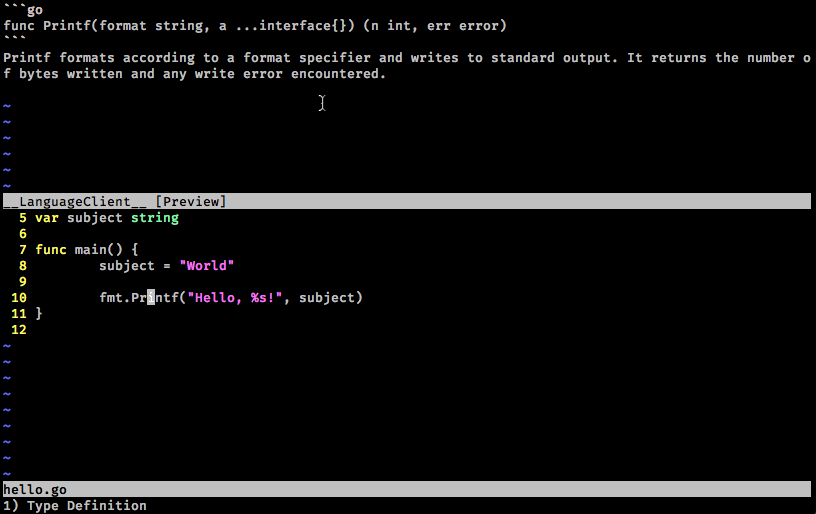
How we run end-to-end tests in Buildkite CI
Felix Becker on September 14, 2018
End-to-end tests are an important part of our testing infrastructure at Sourcegraph. At the top of the testing pyramid, their job is to ensure key user flows work properly from the user interacting with the browser all the way to backend services that work behind the scenes. However, they pose a…
Read more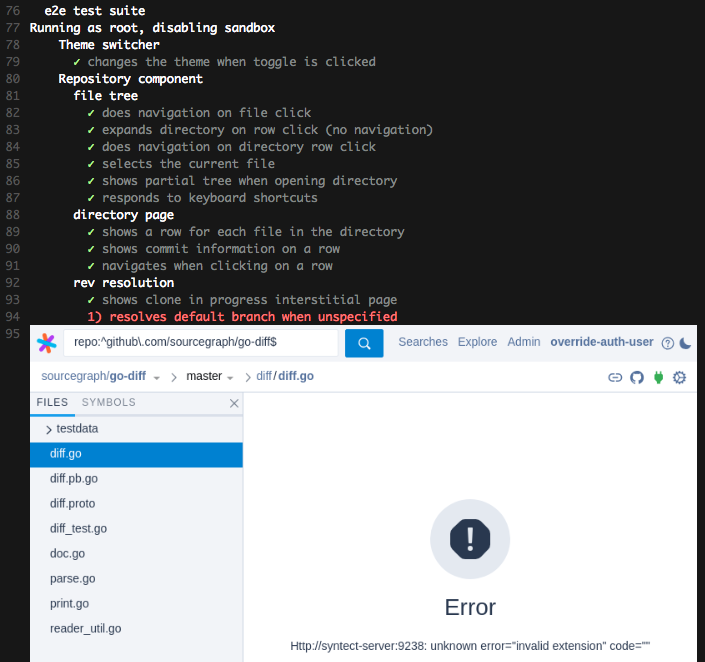
Sourcegraph 2.11: Easier configuration and deployments, and Sourcegraph extensions
Ryan Blunden on September 4, 2018
Our mission is to build the best code search and browsing tool for your team to help you write the highest quality software possible. Here’s new, what’s changed, and what’s fixed. Simplified browser extension configuration Deploy Sourcegraph to Kubernetes with plain YAML Webhooks for manual…
Read more
The pain that minimal version selection solves
Nick Snyder on August 31, 2018
Minimal version selection is an idea that Russ Cox proposed for how to resolve the dependencies of Go modules. When installing or updating dependencies, minimal version selection always selects the minimal (oldest) module version that satisfies the overall requirements of a build. Minimal version…
Read more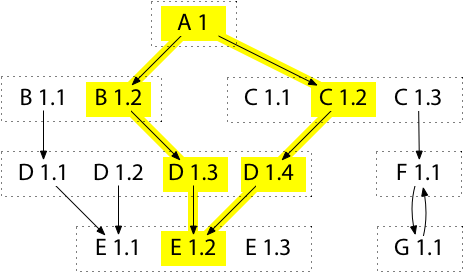
How To Support Your Employee Through Pregnancy, Maternity Leave and the Transition Back To Work
Vanesa Ortiz on August 28, 2018
Today was my first day back to work at Sourcegraph after my 3 1/2 months* long maternity leave. I consider myself lucky to be working at a company that is family friendly and has made my journey to parenthood much easier than expected. I decided to share some of the points I believe Sourcegraph and…
Read more
The August 2018 Docker Hub outage and the impact on Kubernetes deployments
Ryan Blunden on August 17, 2018
Docker announced that the Docker Hub and Docker Store (backed by the same Docker Registry) will be down (totally offline) from 11:00 Pacific Time 25 August with 15-45 minutes (expected) downtime. You may be thinking “I use Kubernetes, doesn't this only affect people executing ? Well yes, but that...
Read more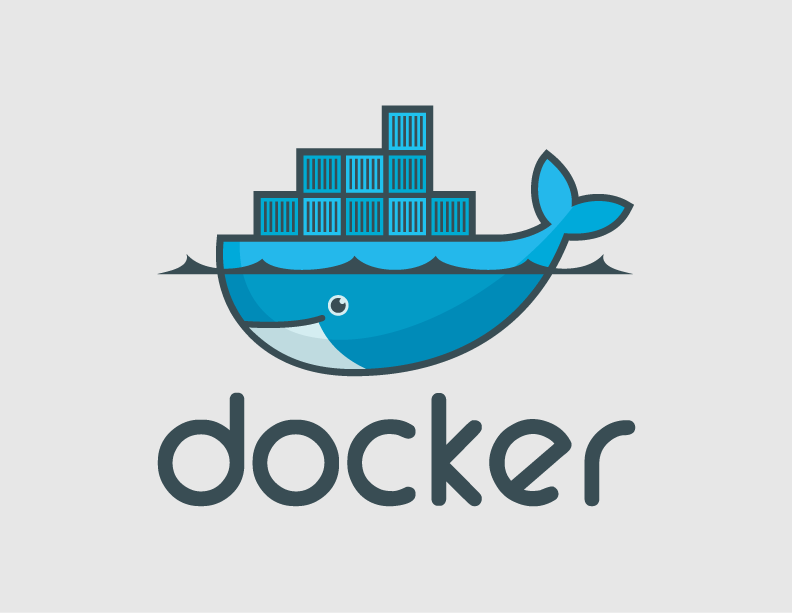
Sourcegraph browser extensions are now open source
Nick Snyder on August 10, 2018
Sourcegraph's browser extensions for Chrome and Firefox are now open source in sourcegraph/sourcegraph. These popular browser extensions add code intelligence (hovers, go to definition, find references, find implementations, and soon much more) to every website where you read code — including Git...
Read more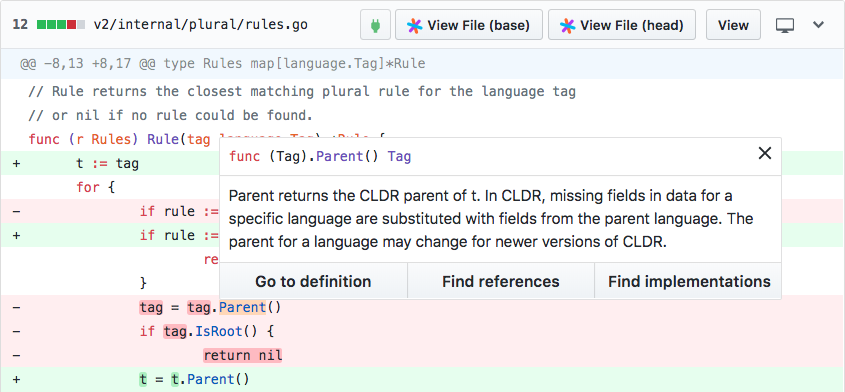
Hack time at Sourcegraph
Nick Snyder on August 7, 2018
One of my favorite things about Sourcegraph is the fact that we are a team of developers building a product for developers. This means that everyone on the team has product intuition and can participate in planning what we are going to work on for our next release. Normally we spend time reviewing…
Read more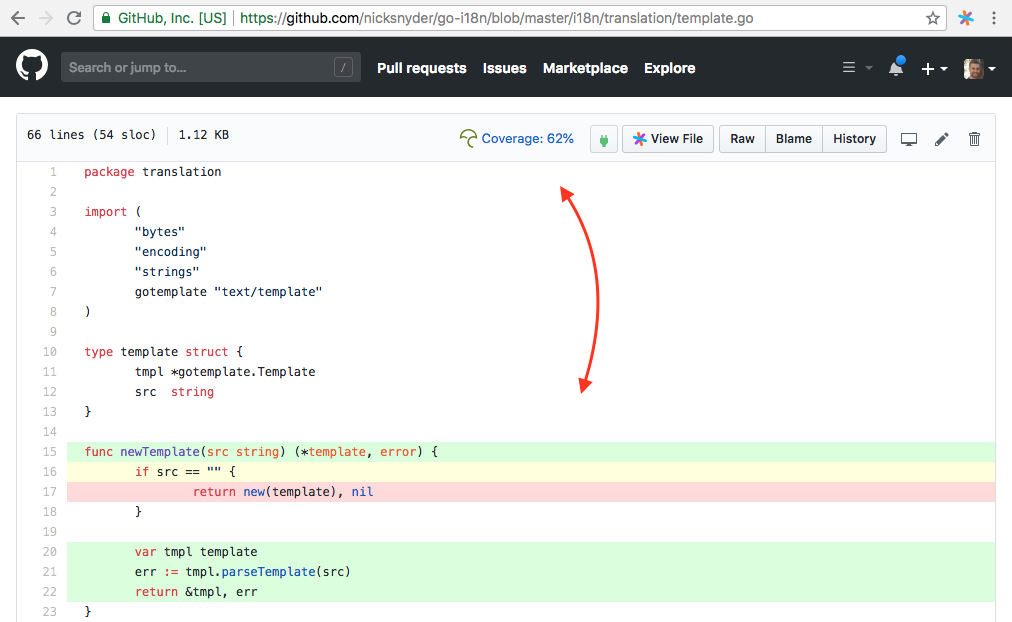
Sourcegraph 2.10: Smoother tooltips, rendered architecture diagrams, and better repository syncing
Geoffrey Gilmore on August 1, 2018
We're working hard to build the best code search and browsing tool for your team, so you can write, review, and ship code better. In this month's release, we focused on improving the user experience and repository syncing for Sourcegraph's integrations with GitHub, GitHub Enterprise, Bitbucket…
Read more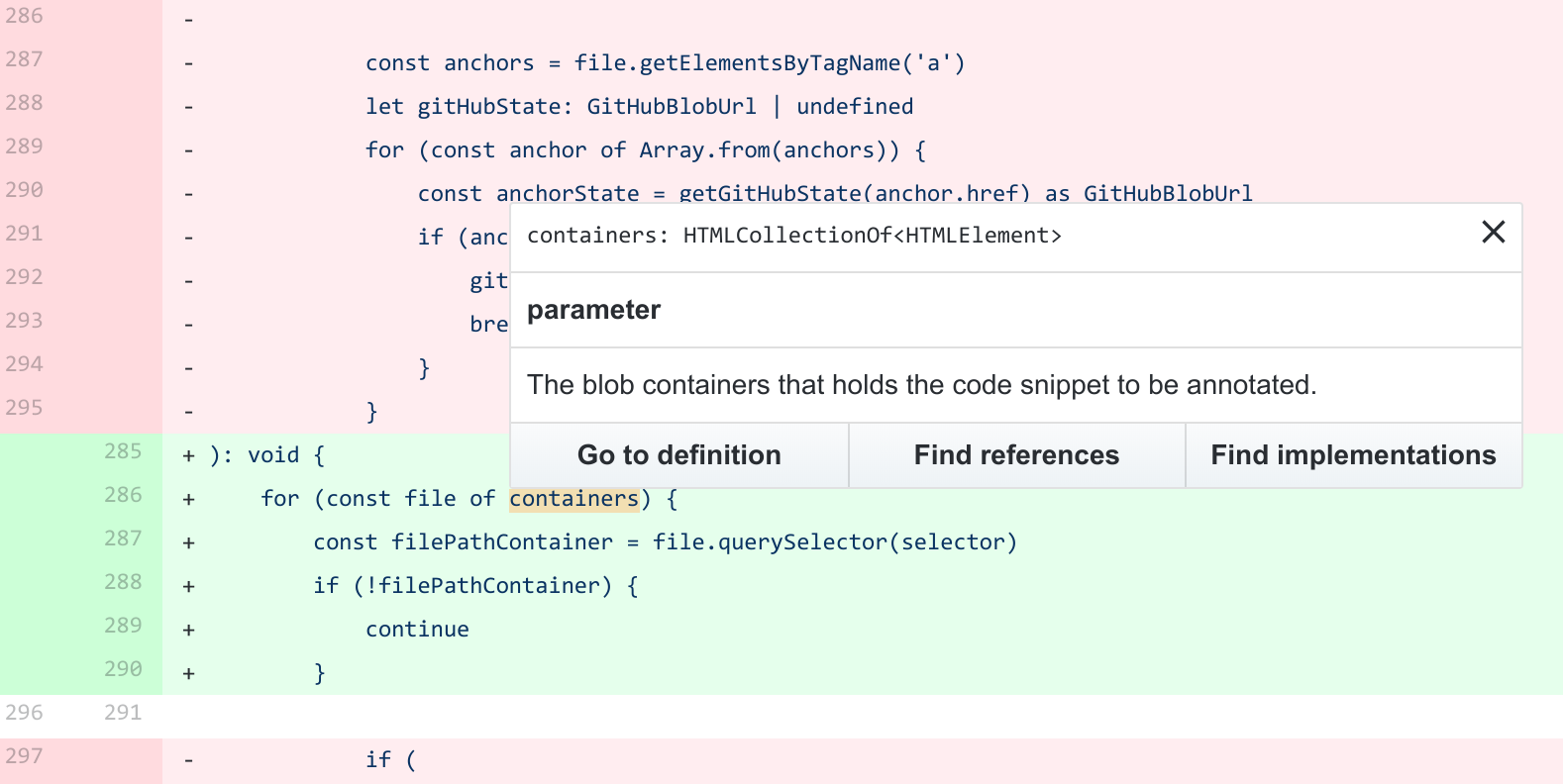
Sourcegraph 2.9: Scaling code search and user rollout in large organizations
Quinn Slack on June 19, 2018
In Sourcegraph 2.9, we focused on improving the code search, rollout, and deployment experience for organizations with 100s and 1,000s of developers and repositories. We're building Sourcegraph to be the best way for developers to search and browse code, and we're thankful for all the feedback…
Read more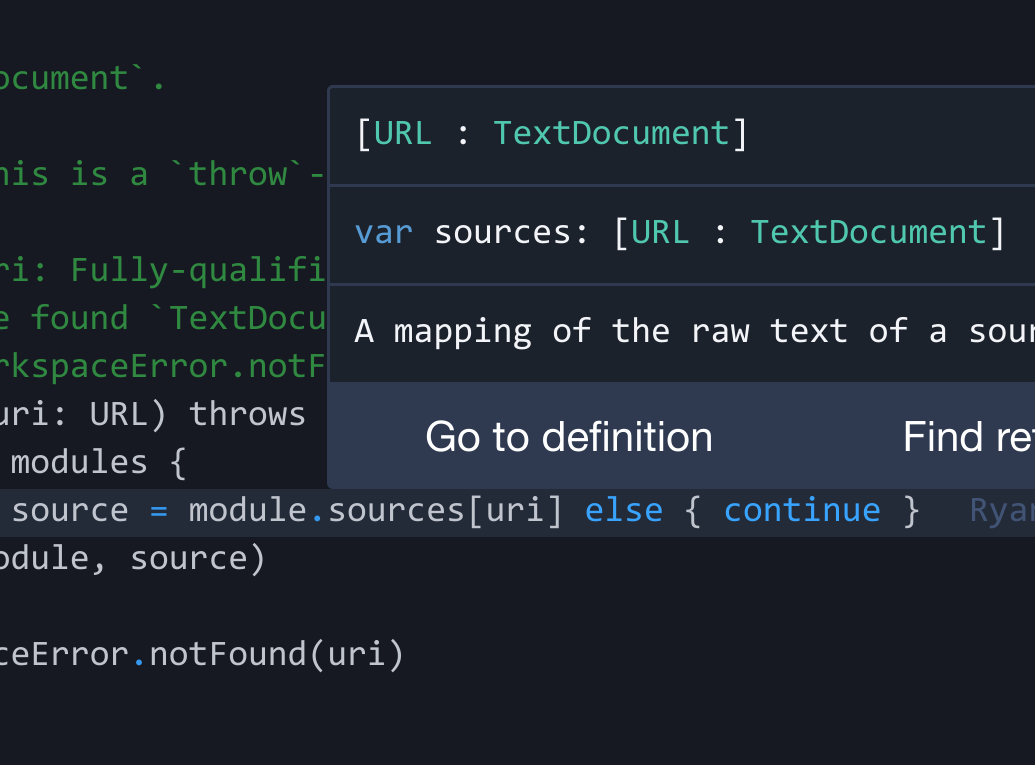
Our project-based interview experiment for hiring engineers
Noemi Mercado on June 19, 2018
At Sourcegraph, we’re building not only a great product for engineers, but also a great, inclusive company for engineers to be a part of. Over the last few months, we’ve been experimenting with our hiring process and wanted to share our experience so far. (Our last experiment was putting open roles…
Read more
Code intelligence for 13 more languages, with first-class LSP support
Geoffrey Gilmore on May 22, 2018
Update: Sourcegraph now uses Sourcegraph extensions for language support. This blog post has been removed to avoid confusion. We're still eager to sponsor people to build and improve open source, LSP-based language servers. Contact us if you're interested, either as a part-time effort or to join ...
Read more
Sourcegraph 2.8: 19 languages, ridiculously huge monorepos, LSP, a GraphQL API, and more
Quinn Slack on May 22, 2018
Sourcegraph 2.8 is out today, with support for more languages, huge monorepos, and more! Sourcegraph is a code search and intelligence tool that helps your team code more productively. With Sourcegraph, developers can find code examples, view references/callers, locate definitions, etc., across all…
Read more
Why Chris joined Sourcegraph
Chris Wendt on April 19, 2018
Having worked at GitHub and spent more time than is probably warranted tweaking my dotfiles, I consider myself a developer tools enthusiast. Recently, I found myself spending more and more of my free time smoothing out my development process, including hacking on auto-import for Haskell in VS Code…
Read more
Sourcegraph 2.7: code intelligence in pull requests and commit diffs
Quinn Slack on April 16, 2018
Sourcegraph 2.7 ships today, with tons of new features and improvements to help your team build better software. Get code intelligence in seconds with no setup, view diffs with code intelligence directly in Sourcegraph, and get more information when finding references. This release comes with many…
Read more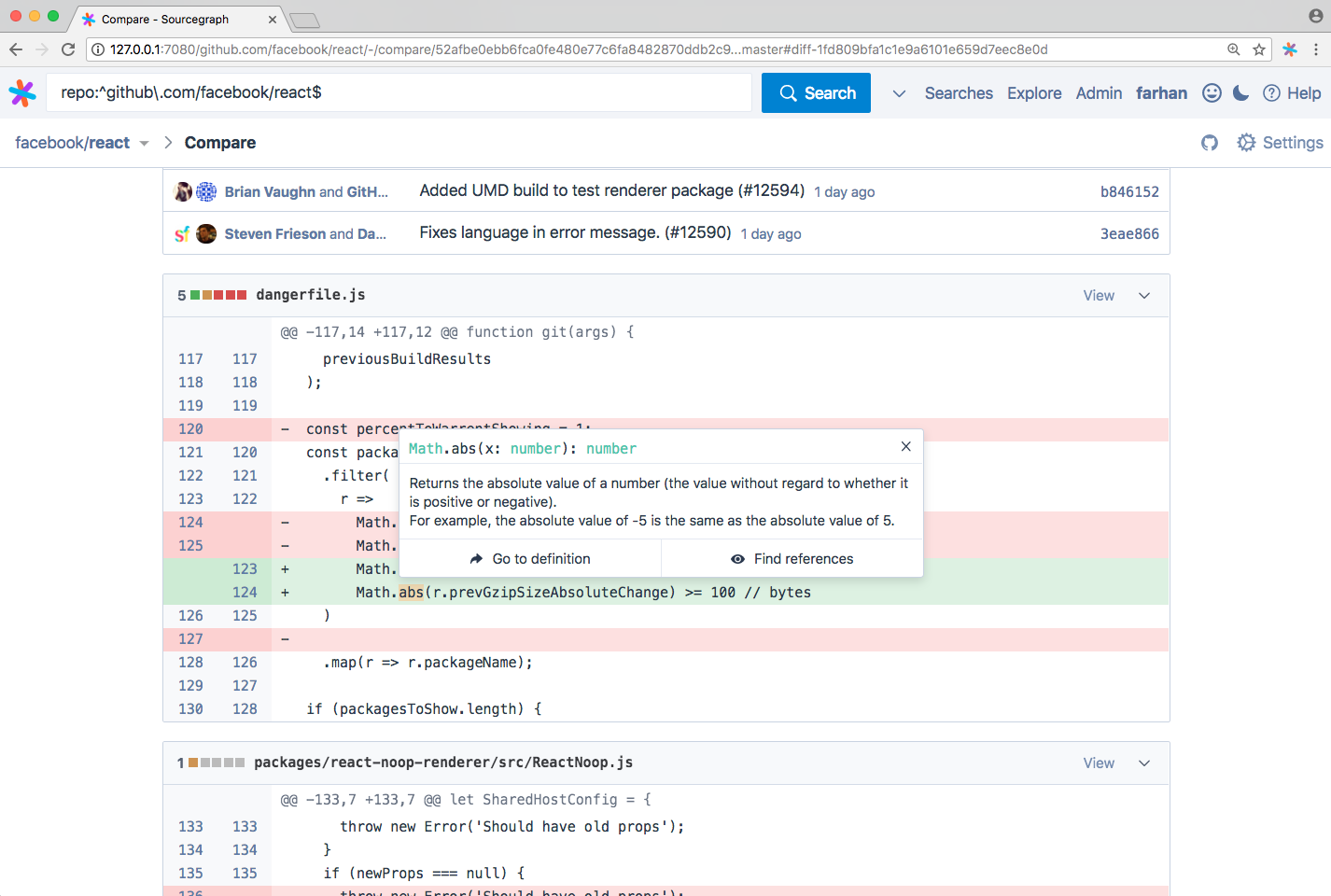
How Sourcegraph builds Sourcegraph
Quinn Slack on March 20, 2018
Our product, Sourcegraph, lets software teams search and explore their code, so naturally we think a lot about how to help software teams ship better software faster. As we've grown, we've learned a lot from GitHub, Visual Studio Code, GitLab, and other teams who have shared their internal proces...
Read more
Powerful code search for Bitbucket Server
Quinn Slack on March 14, 2018
Sourcegraph + Bitbucket Today, we're bringing fast, powerful code search to the thousands of development teams on Bitbucket Server. With Sourcegraph 2.6, we've built out native support for Bitbucket Server to make it easier to get code search across all your Bitbucket Server repositories. Follow…
Read more
Introducing Sourcegraph 2.6: Symbol search for 75+ languages
Quinn Slack on March 13, 2018
We’re excited to announce Sourcegraph 2.6, with tons of new features and improvements to help your team build better software. Search for and jump directly to symbols, search for the code you need more quickly, and set up Sourcegraph to search across all of your code--all available now. This rele...
Read more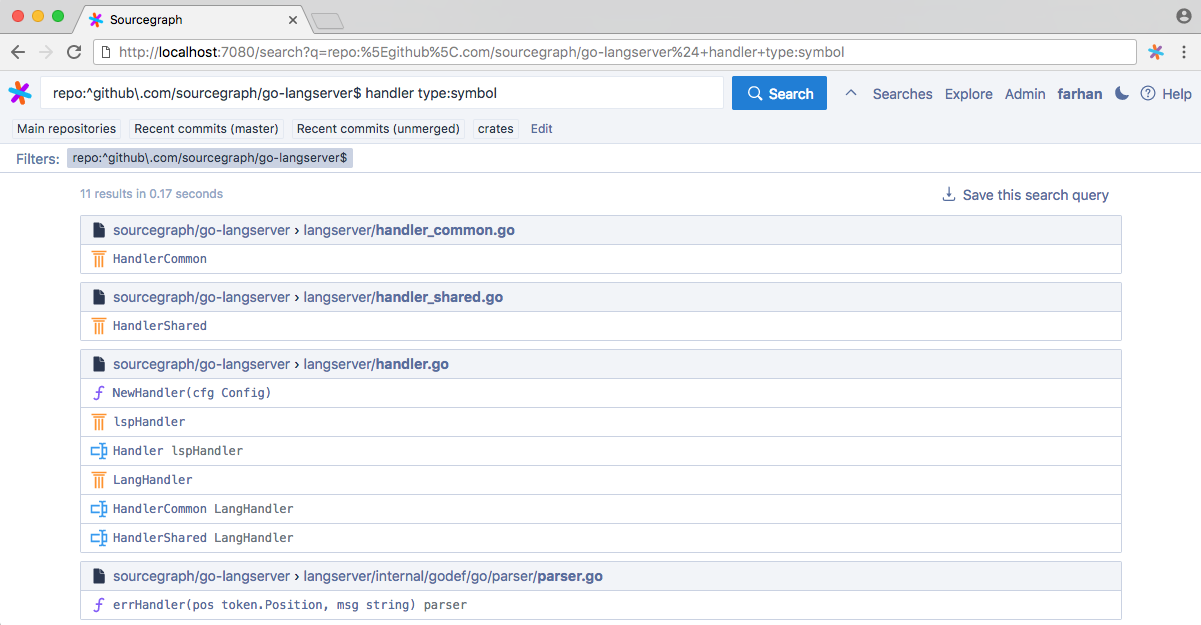
When is it ok to recover from panics in Go?
Nick Snyder on March 6, 2018
In Go, it is idiomatic to have explicit error handling. This means that many functions return an in addition to the expected result (e.g. strconv.ParseBool). Go code can also panic and recover, which is similar to throwing and catching exceptions in other languages. In Go, panic should be reserved…
Read more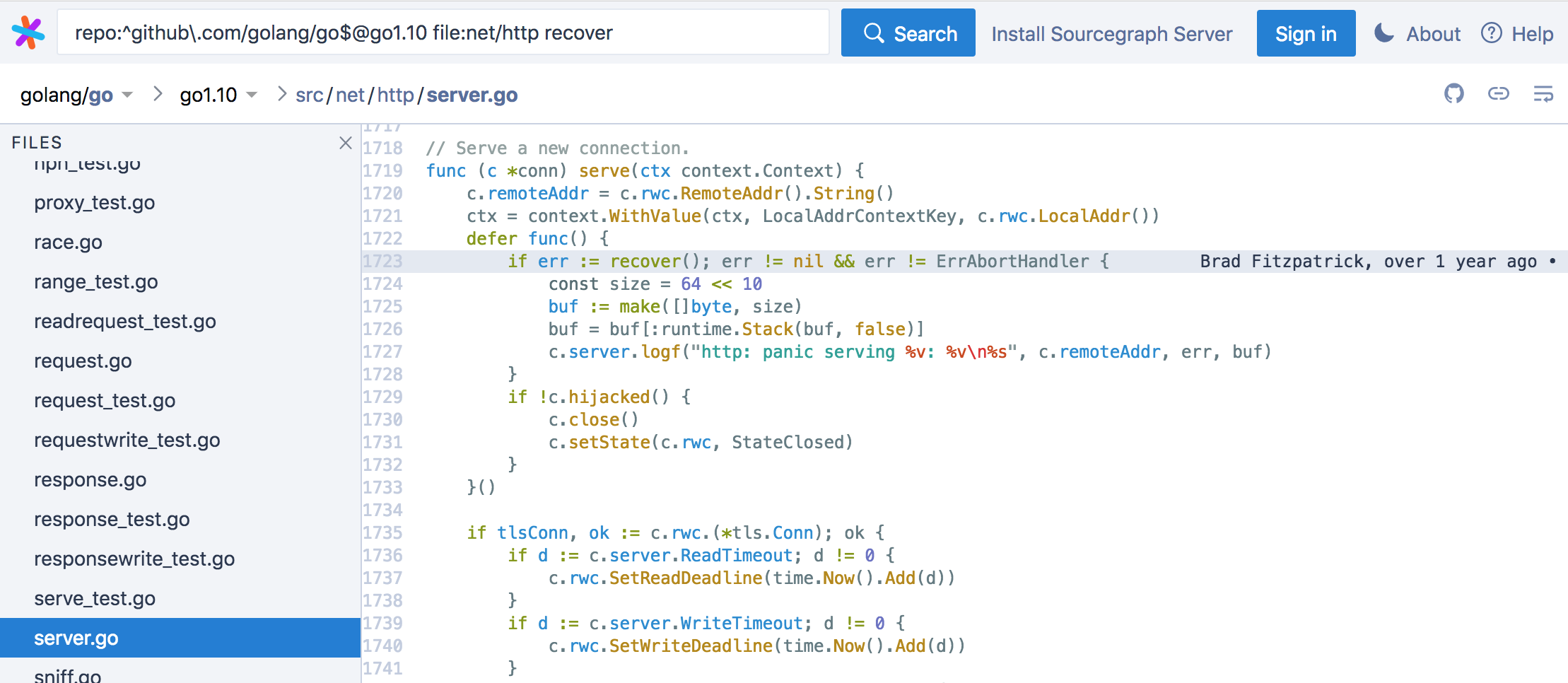
Sourcegraph 2.5: Introducing code change alerts
Quinn Slack on February 8, 2018
Monitor code changes with Google Alerts-style notifications, get code intelligence in reviews/PRs, and search over thousands of repositories in hundreds of milliseconds—all with Sourcegraph 2.5, shipping today. This release also includes other highly requested features, such as native GitLab supp...
Read more
Announcing Sourcegraph 2.4: free, powerful search for your private code
Quinn Slack on January 9, 2018
Sourcegraph 2.4 is here. It is now free for unlimited users and repositories, can be installed in minutes with a single command, and is easily configurable in the new web-based site admin. This release also includes many performance and bug fixes, plus a better interface for monitoring search…
Read more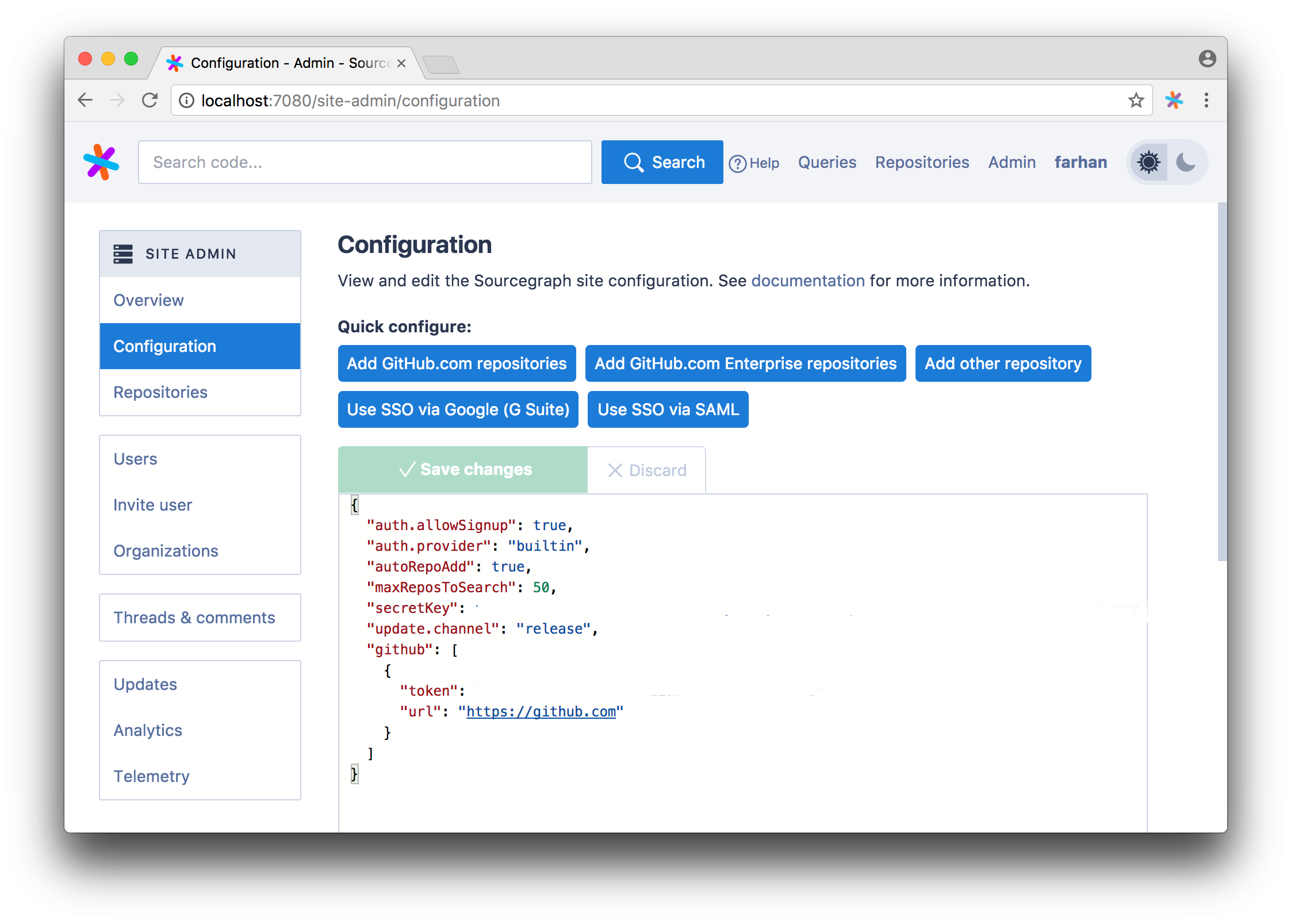
Introducing Sourcegraph 2.3
Quinn Slack on December 5, 2017
Search code over all of your company's repositories, save and reuse common search queries and scopes, and do it all more quickly with style. This release also includes previews of diff/commit search and author/date filters, which help you debug issues and find usage examples in your company’s code…
Read more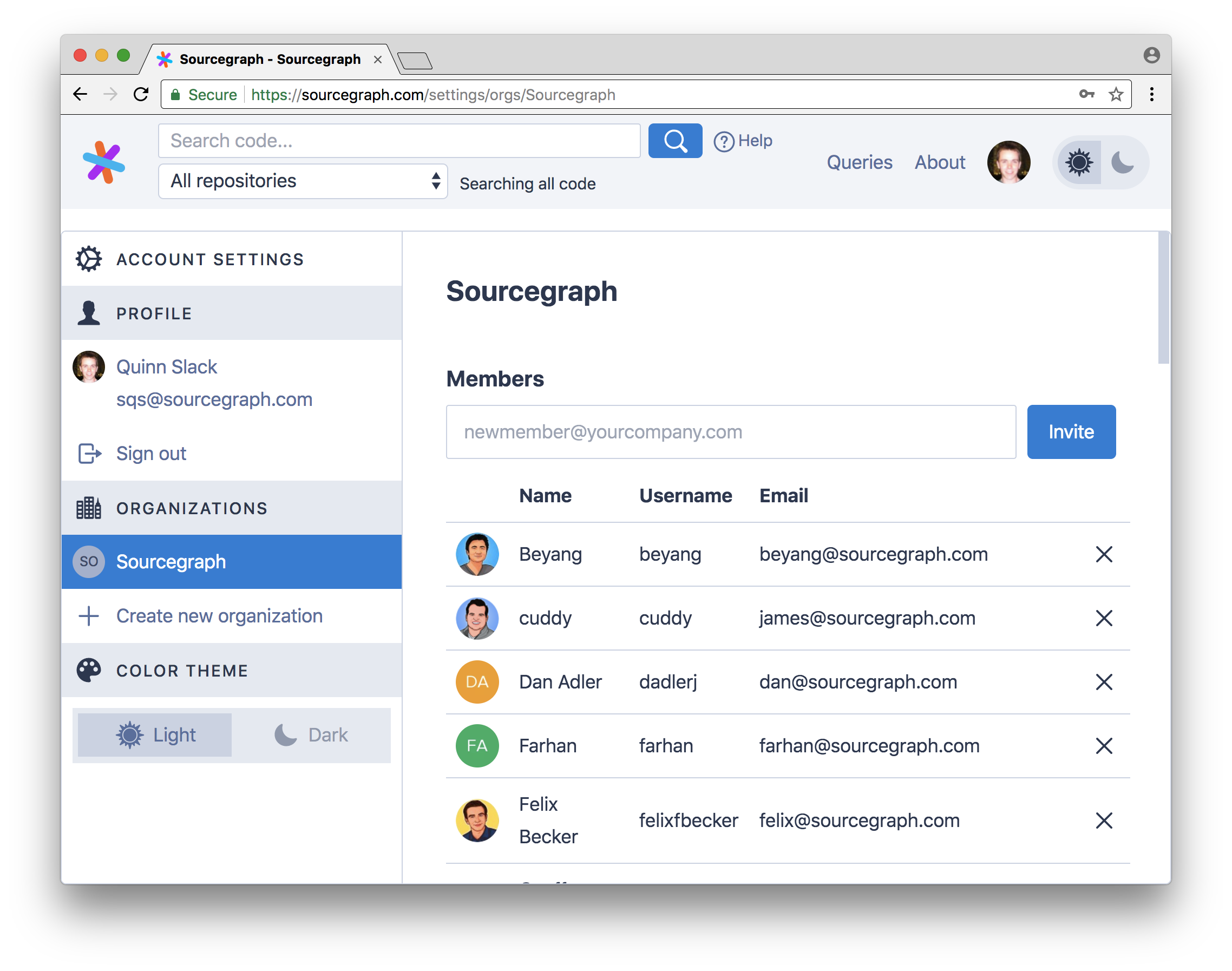
Great code search for AWS CodeCommit
Beyang Liu on November 16, 2017
Install Sourcegraph to get great code search on AWS CodeCommit Sourcegraph brings great code search and understanding abilities to development teams using AWS CodeCommit. Code search helps your engineering team find usage examples, debug errors, reuse existing libraries and packages, and understand…
Read more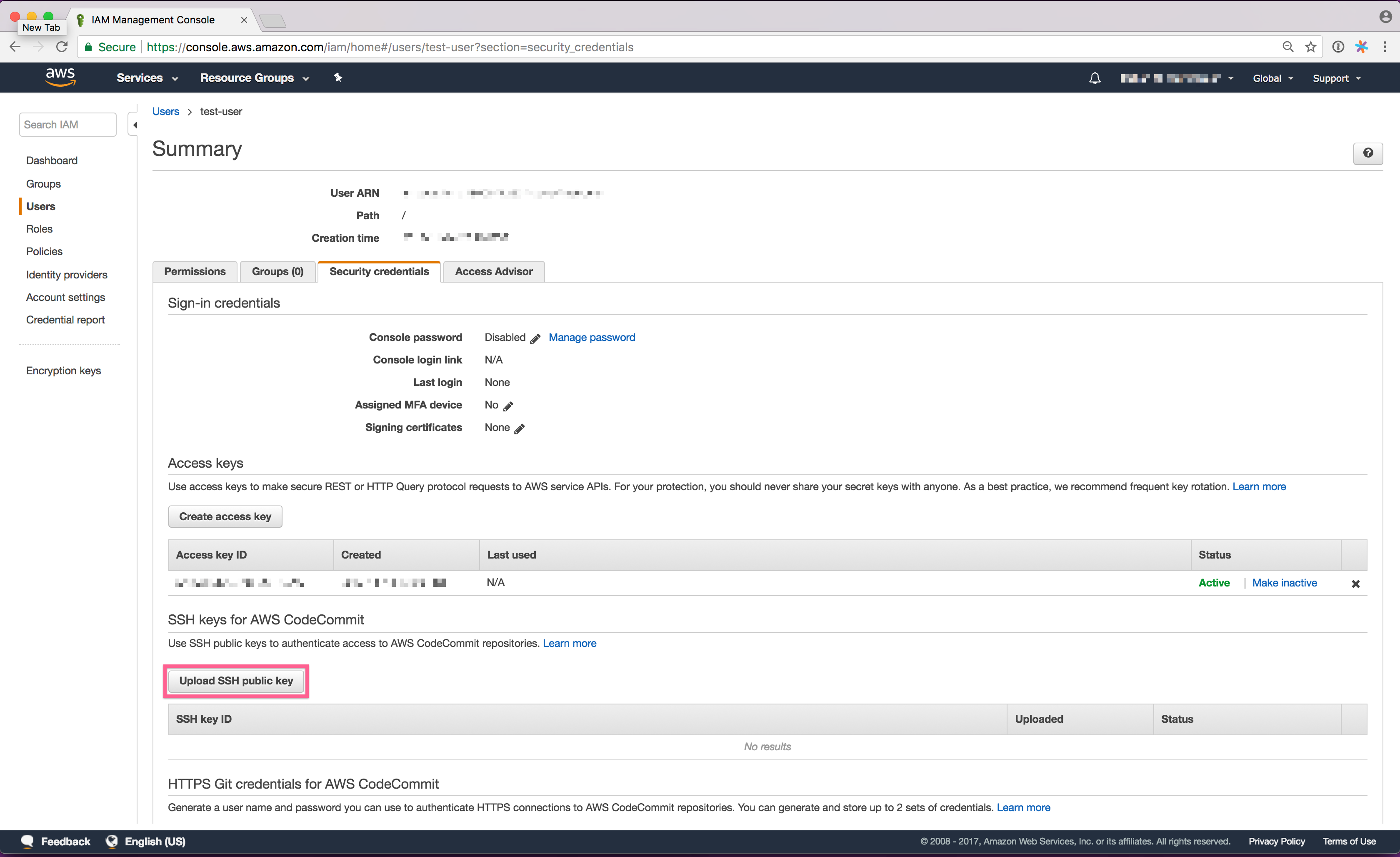
Great code search, bad code search
Quinn Slack on November 15, 2017
This is inspired by the classic essay Good Product Manager/Bad Product Manager. Great code search is so fast and relevant that you use it constantly while coding. It’s one of your top keybindings. Bad code search is slow and stale, and you only find it useful a few times per week. If you haven’t…
Read more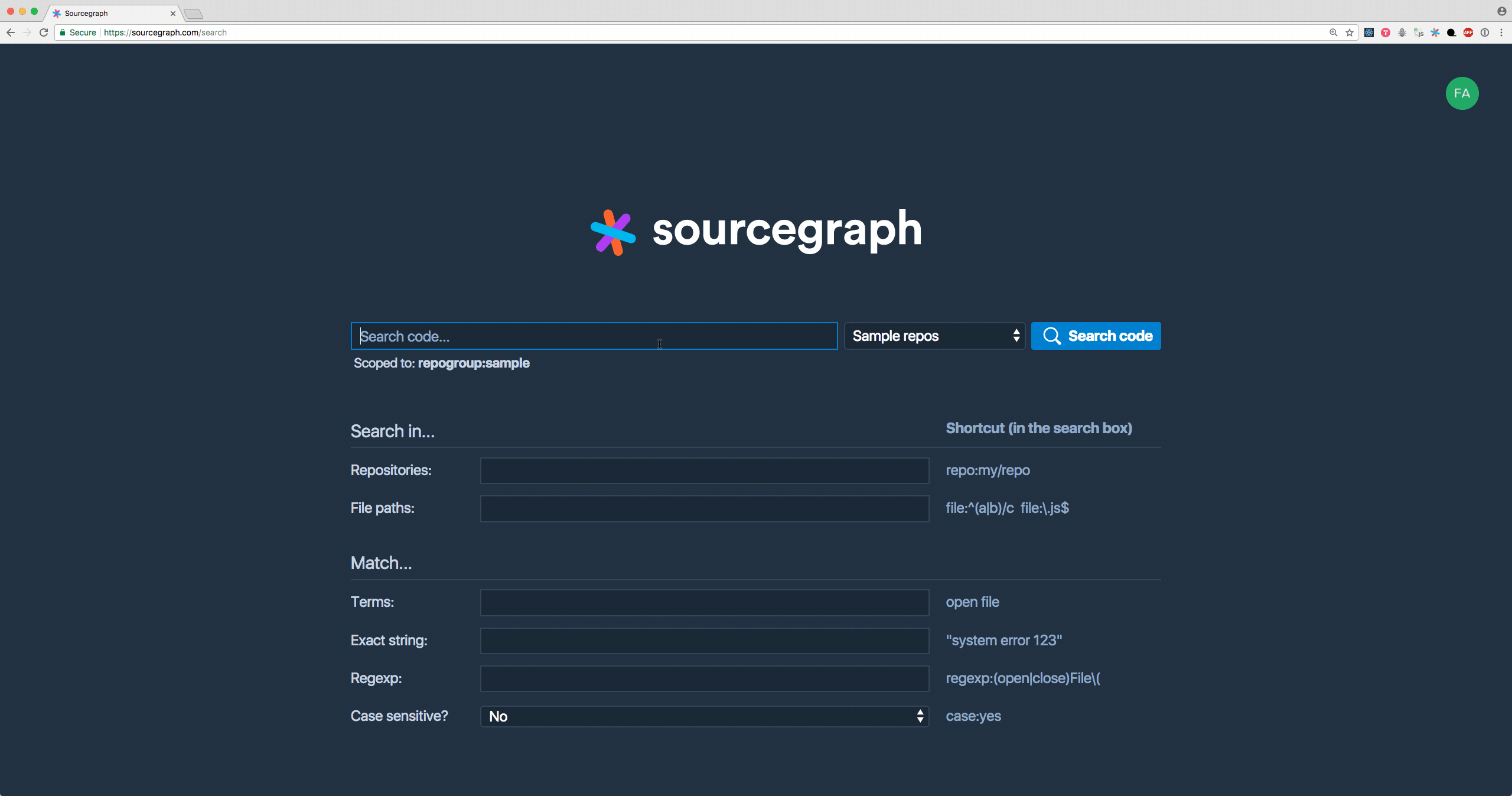
Regexp queries, directories, OpenID Connect, and more updates to Sourcegraph
Quinn Slack on November 13, 2017
We've been hard at work on improvements to Sourcegraph to give you great code search on your company's code. Here's what's new and improved: Code search: There is now a directory listing view with the last Git commit for each subdirectory and file. Query terms are now interpreted as regexps, not…
Read more
More powerful code search on Sourcegraph
Quinn Slack on November 1, 2017
Today, we're releasing more powerful code search on Sourcegraph.com and Sourcegraph. You can use operators such as repo: and file: to restrict your search to certain repositories and files (by regular expression match on their name). For example, repo:foo will restrict your query to repositories…
Read more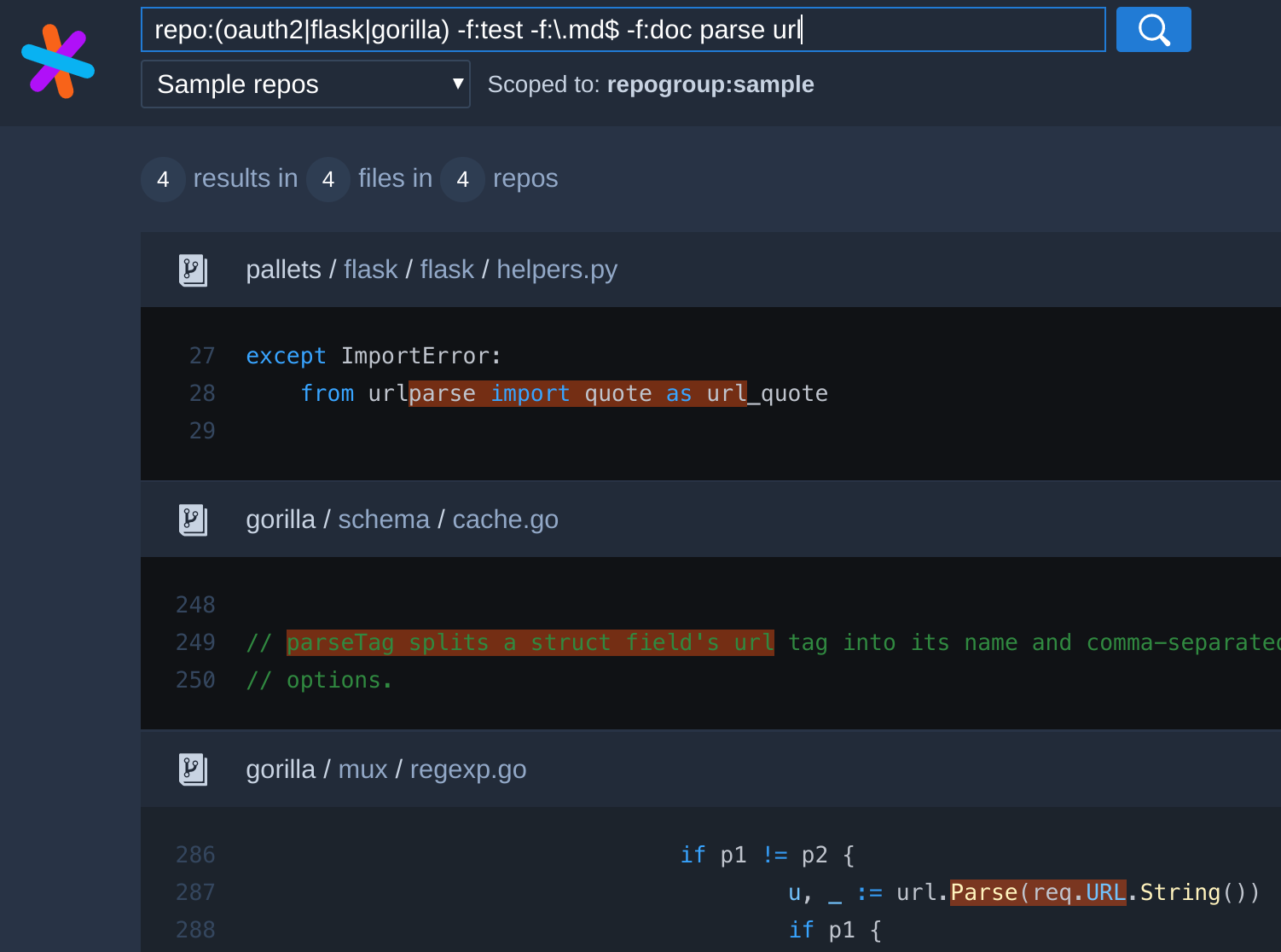
Building toward the Sourcegraph master plan
Quinn Slack on October 6, 2017
Announcing Sourcegraph 2.0
Quinn Slack on September 20, 2017
Update: This blog post has been edited to remove references to outdated features. We’ve been hard at work on some major improvements to how you search, browse, and review code. Today we’re excited to announce several big new features. Introducing Sourcegraph Already used by many of our customers ...
Read more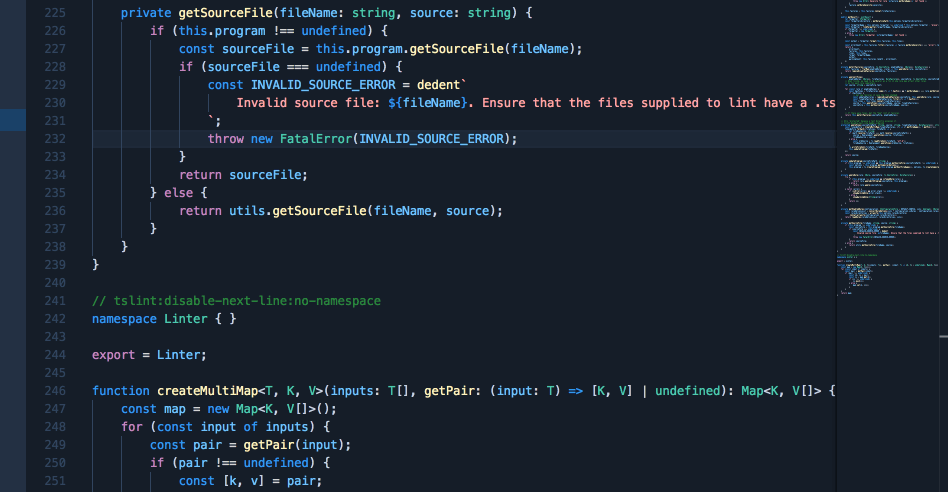
Code intelligence on GitHub embedded code snippets
Matt King on August 24, 2017
At Sourcegraph, we think you deserve code intelligence whenever you’re looking at code. So, when GitHub introduced embedded code snippets for GitHub issues, we quickly updated the Sourcegraph Chrome extension to add code intelligence to these snippets. Code intelligence on embedded code snippets…
Read more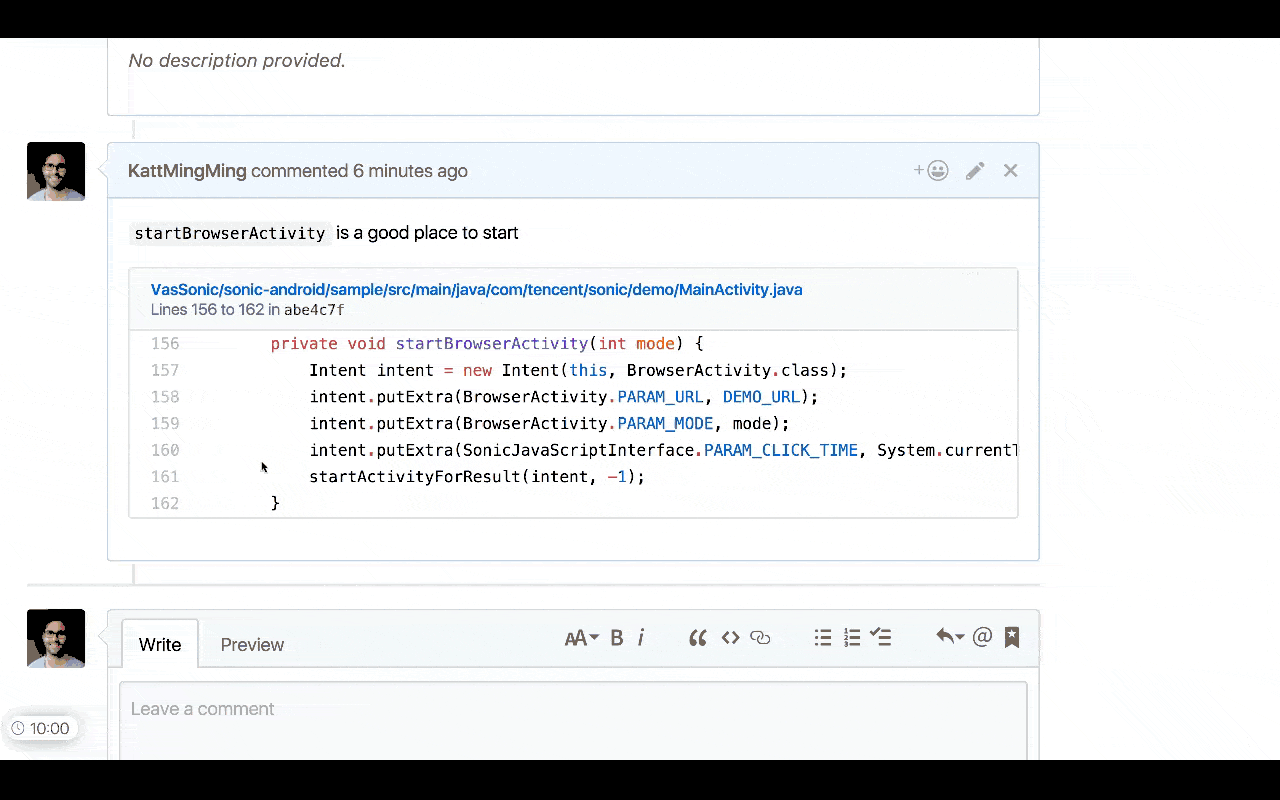
File tree navigation on GitHub? Yes, please.
Matt King on August 9, 2017
We’ve added a file tree to GitHub so that you can quickly explore an entire repository and jump between files without taking your hands off the keyboard.FileTree Get started by downloading the Sourcegraph for GitHub Chrome extension And then jump into a repository https://github.com/hootsuite…
Read more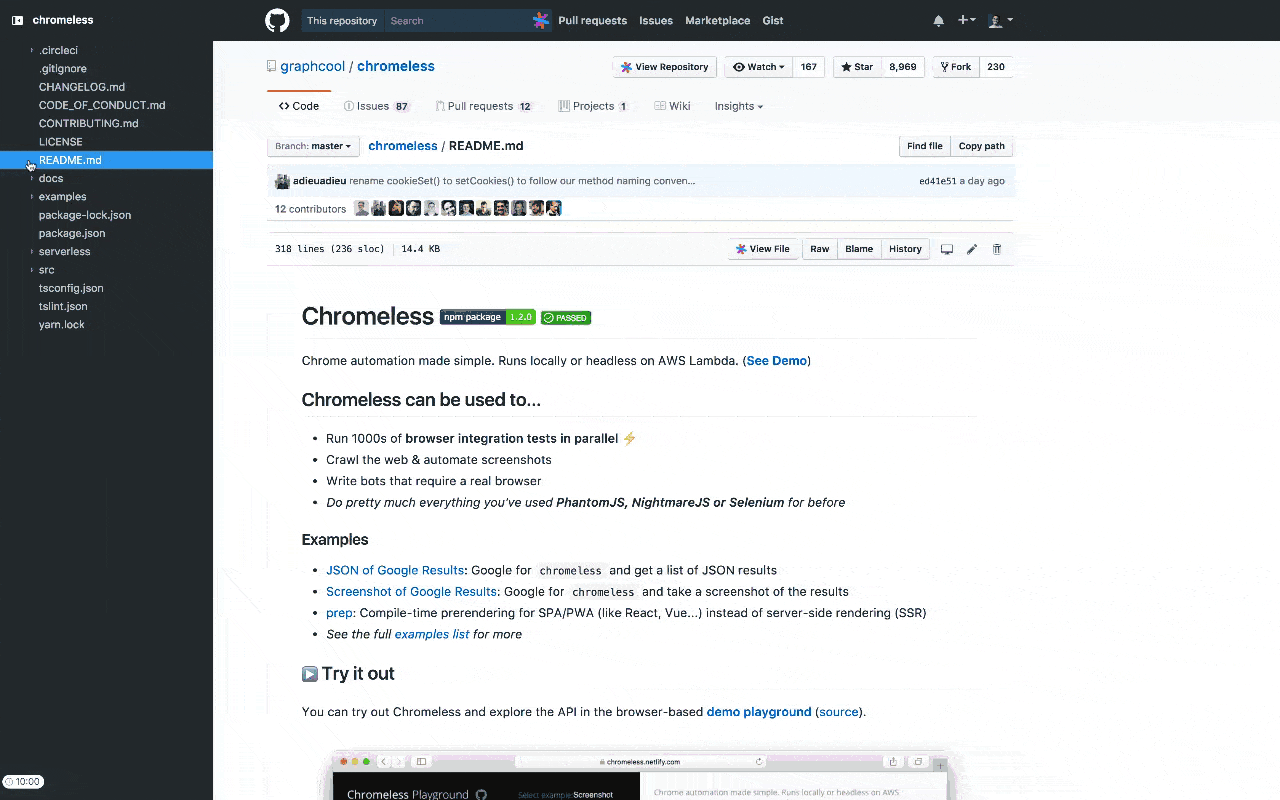
Building a High Performance Key/Value Store
Marty Schoch on July 13, 2017
Liveblog by Matt KingSelection 012 Slides for this talk have been posted here. About The Speaker Marty Schoch is a Senior Software Engineer at Couchbase and the lead developer at Bleve, an open source full-text search library for Go. Overview Marty explores the internals of a high-performance key…
Read more
gRPC in Production
Alan Shreve on July 13, 2017
Liveblog by Beyang Liu (@beyang) Alan Shreve is an hacker, entrepreneur and creator of ngrok.com. ngrok is the best way to connect expose services behind a NAT or firewall to the internet for demos, webhook development and IoT connectivity. Today, he's giving us a whirlwind tour of gRPC and how to…
Read more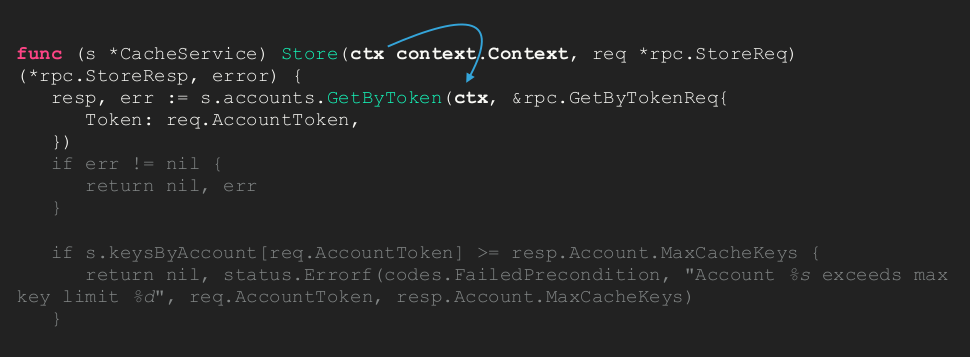
JP Robinson of NYTimes on Go kit, Gizmo, and Marvin
Beyang on July 12, 2017
jp robinson JP Robinson, principal engineer at the New York Times, has "drunk Peter's koolaid" with respect to Go kit. github.com/NYTimes/gizmo adapts Go kit for use inside a production ecosystem with a bunch of existing legacy services. The NYTimes uses it across almost all their production Go…
Read more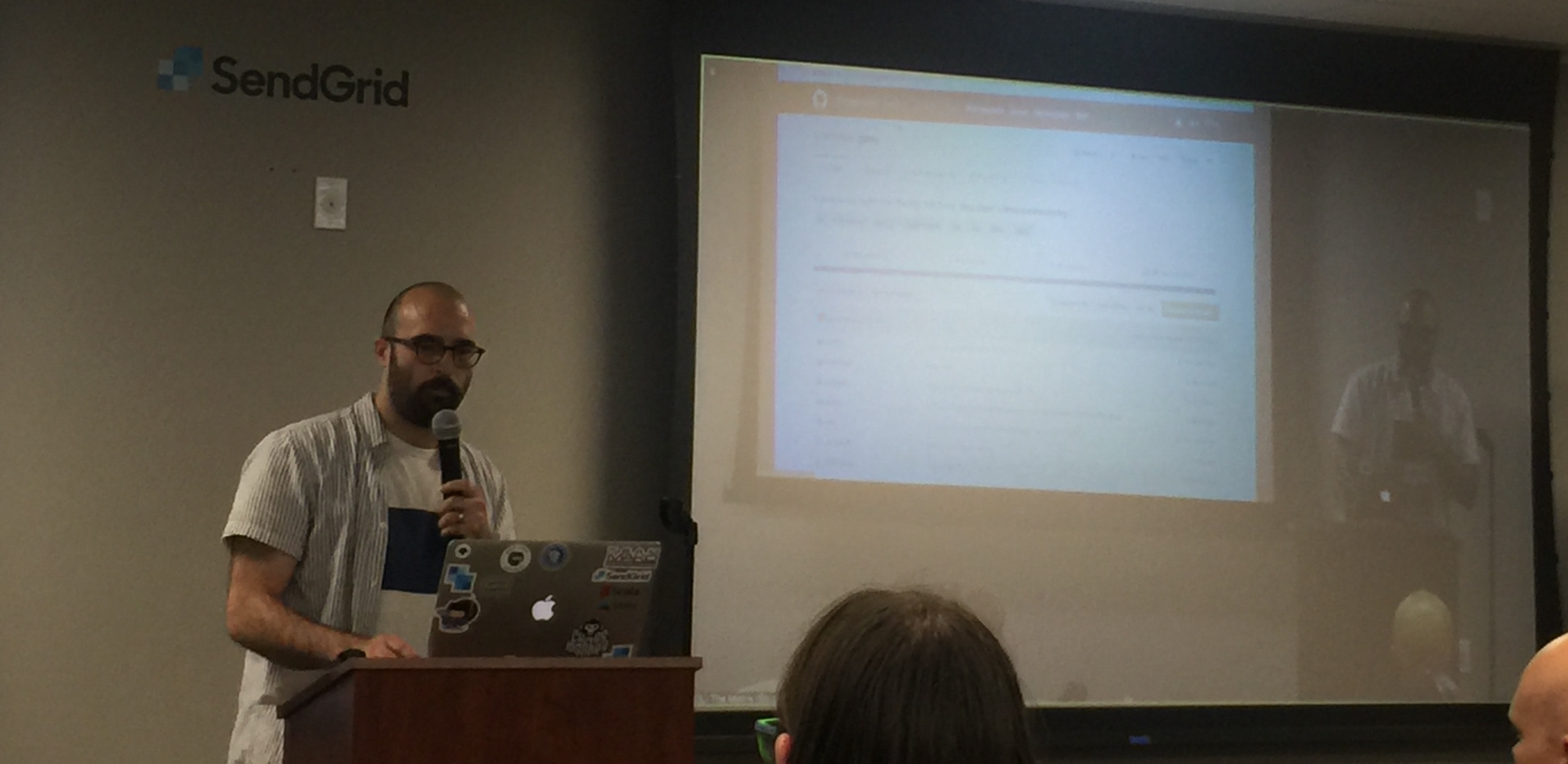
Better GitHub code search and browsing with the Sourcegraph Chrome extension
Matt King on June 27, 2017
Faster, smoother GitHub code browsing with the updated Sourcegraph Chrome extension. We’re excited to announce more improvements to the Sourcegraph Chrome extension. More than 10,000 developers use it to browse and search code on GitHub with the power of an IDE. In addition to the new features…
Read more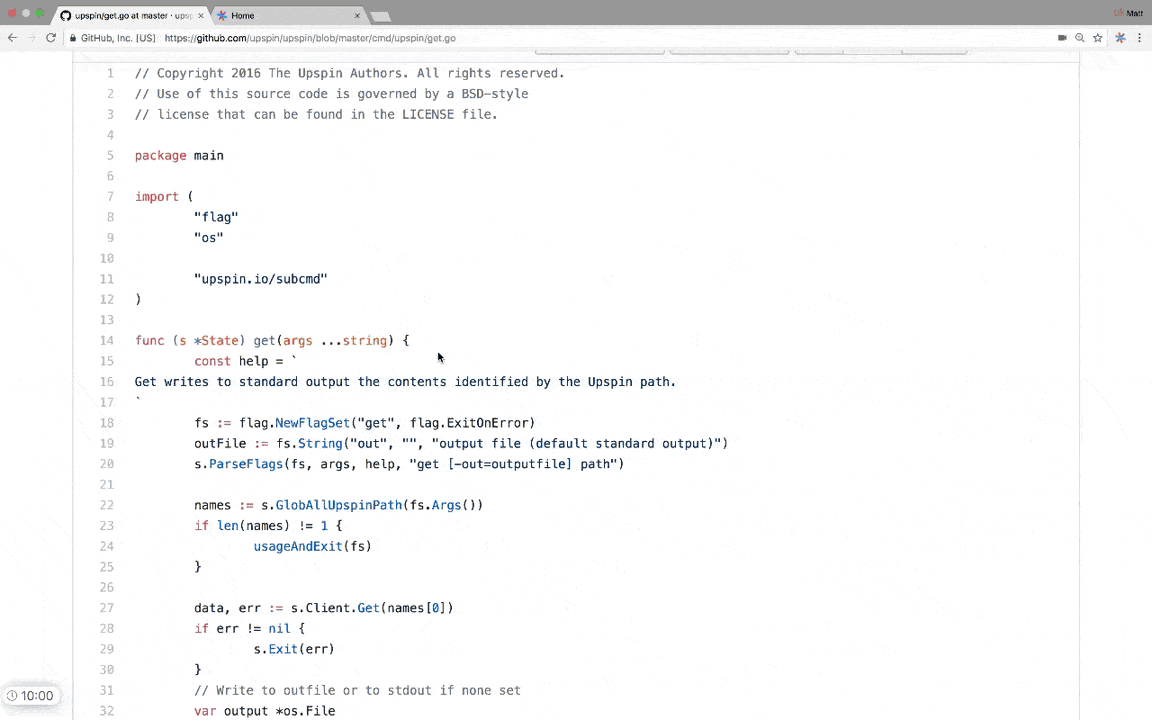
Sourcegraph, code intelligence, and the Language Server Protocol
Beyang Liu on May 15, 2017
Pick your favorite Java repository and a revision and file at random (or try this one). Visit that file in Sourcegraph and within seconds, you can jump to definition (Ctrl/⌘-click), find all references (right click), search for symbols (Ctrl/⌘-p), and view usage examples drawn from other projects…
Read more
Code Intelligence for Java now available on Sourcegraph
Beyang Liu on April 11, 2017
Today, we announce general availability for Java on Sourcegraph. If you write Java, this means that you can now use Sourcegraph to: Explore code without losing your place in your editor Get IDE-like functionality to your code review tool Learn from usage examples drawn from across the open source…
Read more
See how many people use a Java library, with Sourcegraph badges
Beyang Liu on April 11, 2017
Update (September 20, 2017): Viewing a list of repositories that refer to another repository is currently disabled. It will be added back soon. Viewing function call sites across repositories is still supported. We’re excited to announce that Sourcegraph “used by” badges now support Java libraries…
Read more
Introducing code search in Sourcegraph
Quinn Slack on April 7, 2017
In-repository code search is now available in Sourcegraph. Simply click the magnifying glass icon above the file tree, type your search term, and click enter. Once you select a result, you’ll get full code intelligence, including our info panel whenever you click a method, variable or struct. In…
Read more
How Caddy auto-detects HTTPS interception
Matt Holt on March 3, 2017
Matt Holt is the creator of the popular Caddy Web Server. Caddy is called what it is because it acts like a compartment for all your server things. Most people use its HTTP server, but Caddy can also serve DNS, and there are a number of other plugins that extend Caddy’s functionality.1*dxC5SLwJzx…
Read more
Code Intelligence now available for Java on Sourcegraph.com
Beyang Liu on March 1, 2017
Today, we’re enabling Code Intelligence on Sourcegraph.com for Java projects that use Maven. Our preview release of Java means you can jump to definition, find references, and hover over for docs on many of your favorite Java repositories — all without configuring a single editor plugin or clonin...
Read more
Part 1: How Sourcegraph scales with the Language Server Protocol
Beyang Liu on February 27, 2017
The problem of Code Intelligence and the need for an open standard Update: Part 2 of this series is now published. Sourcegraph lets you view any line of code in your web browser with all the navigation features of an IDE and more. That includes both classic abilities — like jump-to-definition, find…
Read more
Part 2: How Sourcegraph scales with the Language Server Protocol
Beyang Liu on February 22, 2017
Making Code Intelligence “just work” In my last post, I introduced the Language Server Protocol as the open source protocol that we at Sourcegraph believe will enable a new set of developer tools powered by Code Intelligence. Code Intelligence, if you recall, is just shorthand for jump-to-def find…
Read more
See how many people use your library, with Sourcegraph badges
Stephen Gutekanst on February 13, 2017
Update: See "Repository badges" in Sourcegraph documentation for the latest information about this feature.
Read more
Go code intelligence on Sourcegraph: now in general availability (GA)
Quinn Slack on January 25, 2017
First, some background: Beyang and I have deep respect for how Google builds software. Beyang interned there, and I've worked with Googlers on many open source projects, including Chromium. What’s their secret? How are they so good? Ask any Google developer, and they’ll give much of the credit to…
Read more
Sourcegraph founders featured on Forbes “30 under 30” list
Rich Taylor on January 6, 2017
I have been fortunate in my career to work with some amazing founders and CEOs. Lloyd Tabb, Ben Porterfield, and Frank Bien at Looker are building the data platform that I have been craving since I started working in technology. Nat Friedman and Miguel de Icaza at Xamarin brought mobile development…
Read more
Poetically simple code review
John Rothfels on November 1, 2016
(Note: if you want to skip the poetry and just check out the project, click here) Begin code review. Too many lines, what to do? Hmm. LGTM?Code review is tedious. there's a better way to review fast but ensure good code quality: One-click jump-to-def and hover over for docs. Save time and focus…
Read more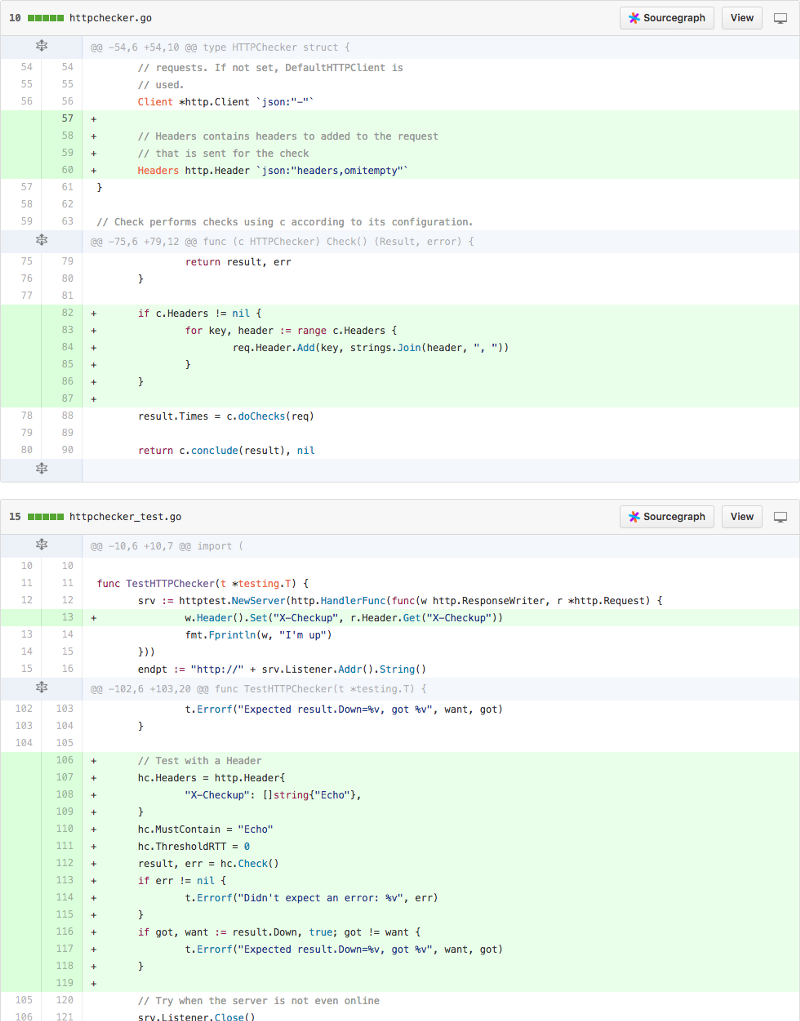
Toward a URL for every function in the world
Quinn Slack on November 1, 2016
What’s the best semantic and future-proof way to link to a piece of code? There's been some interesting discussion about the right way, and it’s something we think about a lot at Sourcegraph as we build a better way for developers to discover and understand code. The consensus is that when you’re…
Read more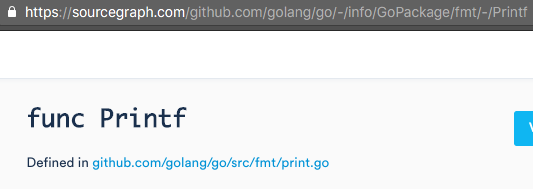
Sourcegraph: the best way to read code just got better
Quinn Slack on October 4, 2016
Today, we’re announcing a new edition of Sourcegraph that makes it even faster and easier to answer your everyday programming questions. If you code in Go, check it out now. If you use another language, sign up for the beta — we’ll have news for you in the next couple of weeks! If you’re new to…
Read more
5 short stories from open source: pains in gains
Lynn Langit on September 14, 2016
Lynn Langit, Cloud & Data Architect Director of Teaching Kids Programming (slides)1*3eFc2KNwHBjrHFpD vjbhA She tells the story of Matt, a fifth grade history teacher who wrote some bacon-related code in Swift Lynn’s daughter has been coding since age 8 and taught Matt how to code. Matt now teaches…
Read more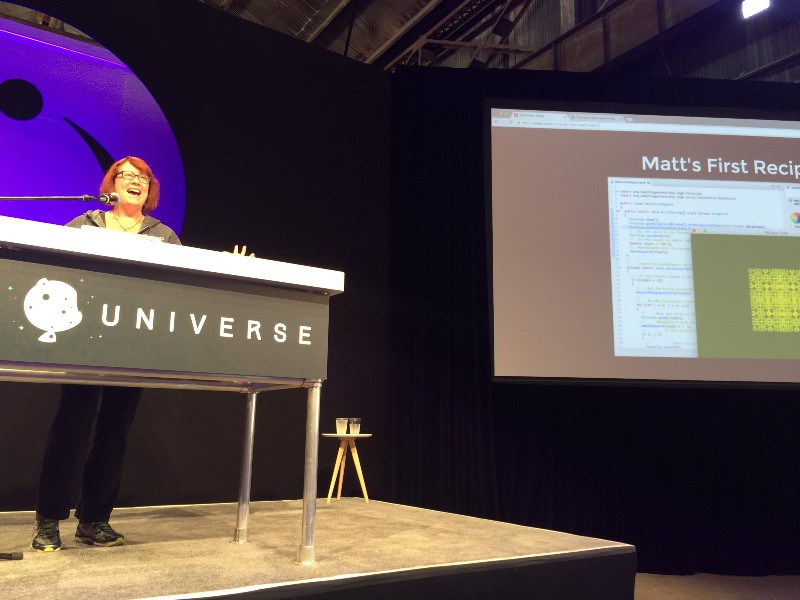
Why we open sourced our uptime monitoring system
Beyang Liu on September 8, 2016
About a month ago, Sourcegraph released Checkup, an open source, self-hosted uptime monitoring system written by Matt Holt. Following its release, a lot of people asked us how we were using Checkup at Sourcegraph. Today, we’re sharing our public status page, powered by Checkup, and laying out some…
Read more
What we can learn from the IBM System/360, the first modular, general-purpose computer
Beyang Liu on August 26, 2016
At Sourcegraph, we believe building for the future requires learning the lessons of the past. This is the first in a series of blog posts that cover historical anecdotes about software engineering that have inspired us as we build tools for the modern developer. We’re sharing these, because we th...
Read more
Thyme: a simple CLI to measure human time and focus
Beyang Liu on August 15, 2016
It’s like a CPU profiler, but for your productivity rather than your machine’s Do you ever think about how to make yourself a more productive programmer? At Sourcegraph, this is a question we think about every day. Our entire mission is to make your life as a developer easier and more efficient…
Read more
How to make your open source project thrive
Andrey Petrov on June 21, 2016
Andrey Petrov (@shazow) spoke at the Sourcegraph office about lessons learned from his successes and “many failures” (his phrase) creating open source projects. Andrey is author of the popular urllib3 library (explore urllib3 on Sourcegraph) and several other popular open source libraries. During…
Read more
Announcing Checkup: simple, self-hosted health checks
Beyang Liu on June 8, 2016
Today, Sourcegraph is excited to announce Checkup, a simple tool that lets you easily create distributed, self-hosted health checks and status pages.0*bR4H1dPKkhf6T-hC The Checkup status page works out of the box Monitoring uptime is a crucial part of running any web service. It lets you sleep well…
Read more
Building a product, one user interview at a time
Quinn Slack on May 30, 2016
From the very beginning at Sourcegraph, it’s been our goal to build a product so helpful that people could never go back to programming the old way. Sourcegraph helps developers discover and understand code, and to address such a complex need requires us to deeply understand our users. We’d like to…
Read more
IPFS: The Permanent Web
Juan Benet on May 30, 2016
Juan Benet (@juanbenet) spoke at the Sourcegraph Hacker Meetup about his project, “IPFS: The Permanent Web” (slides and video). IPFS is a bold attempt at evolving the Internet’s infrastructure. Here’s how Juan describes it to Sourcegraph: IPFS is a global, versioned, peer-to-peer file system. It…
Read more
5 easy ways to start contributing to Docker using Sourcegraph
Beyang Liu on May 30, 2016
There are many benefits to contributing to a popular open source project like Docker: You earn recognition for improving a project used by many people. You get to collaborate with other amazingly smart people in the open source community. You become a better programmer yourself through the process…
Read more
Appdash, an open source perf tracing suite
Quinn Slack on May 30, 2016
Every developer knows they should instrument their app to identify perf bottlenecks, but it’s hard to actually get around to doing it — especially when you’re focused on shipping the latest and greatest features of your site.0*jXkIPsoJBjXY80cs Today we’re announcing Appdash, an open source multi…
Read more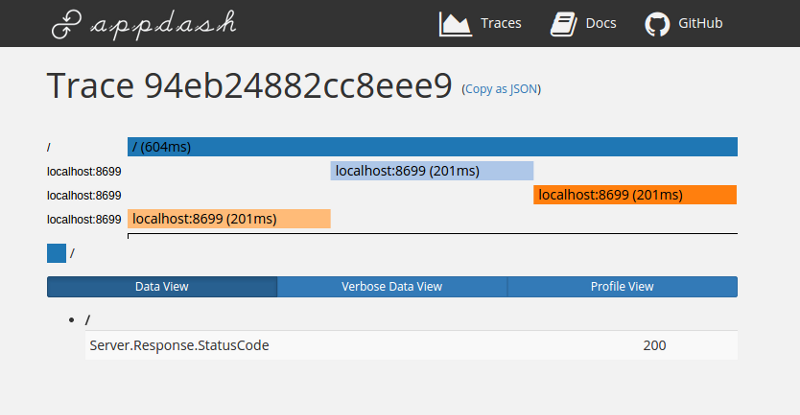
Browse & review code on GitHub like in an IDE, with the Sourcegraph Chrome extension
John Rothfels on May 30, 2016
Wouldn't it be awesome if you could review, browse, and search code on GitHub as though you were in an IDE, with jump-to-definition, doc tooltips, and cross-references? We think so. That’s why we built the Sourcegraph Chrome extension for GitHub. Update (June 22, 2016): Added support for pull…
Read more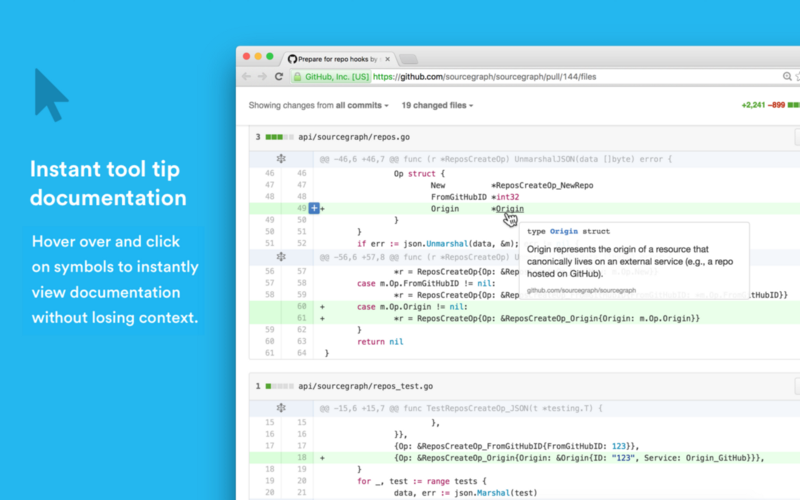
GitHub Universe liveblog: Clarence Wardell, U.S. Digital Service
Beyang Liu on May 30, 2016
Innovation fellow of the U.S. Digital Service, a.k.a. the “president’s startup.” His time as innovation fellow started in 2014, right around the time the conversation around law enforcement and Ferguson was coming to a tipping point. Big demand for better data around policing, especially with…
Read more
Getting started with Sourcegraph
Quinn Slack on May 30, 2016
Use Sourcegraph to discover and understand code better There's a gold mine of code available to programmers, but choosing the right library and understanding how to use it can be tricky. We created Sourcegraph, a fast, semantic code search and cross-reference engine, to help developers like you…
Read more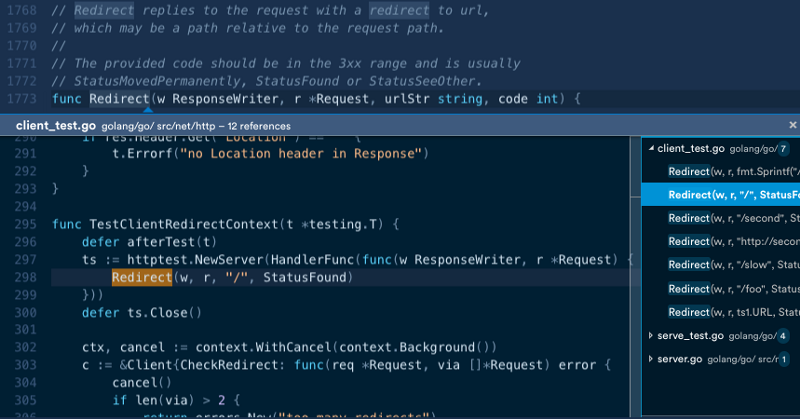
Google I/O talk: Building Sourcegraph, a large-scale code search & cross-reference engine in Go
Beyang Liu on May 30, 2016
This was originally a talk at Google I/O 2014. Check out the slides and YouTube video. Thanks to the Go team for inviting us! What is Sourcegraph? Sourcegraph is a large-scale, multi-language code search and cross-reference engine that indexes hundreds of thousands of open source repositories…
Read more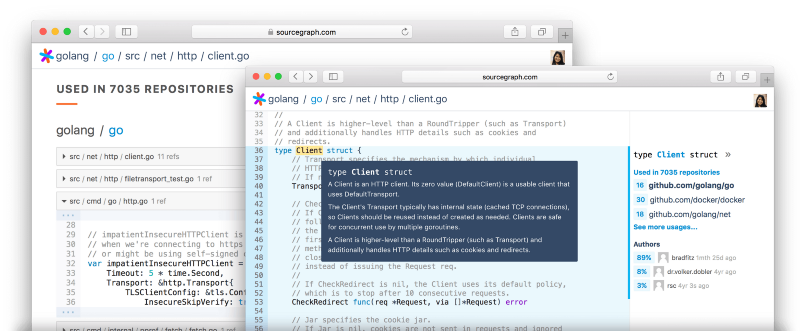
How tech startups test, organize, and review their code
Beyang Liu on May 30, 2016
Building software is hard. We hosted a casual dinner here at the Sourcegraph office in downtown San Francisco for ten developers from leading startup software teams. At the dinner, the teams shared a behind-the-scenes look at their processes (and frustrations): testing, deployment, and code reviews…
Read more
The pain of code review: how different teams manage, scale, and perform code reviews
Quinn Slack on May 30, 2016
We invited ten developers from leading tech startups around the Bay Area to join us for an “off-the-record” dinner to discuss the practice of code review (and what we want in an ideal code review process). Below is a wrap-up of the salient points from our dinner. Given the off-the-record nature of…
Read more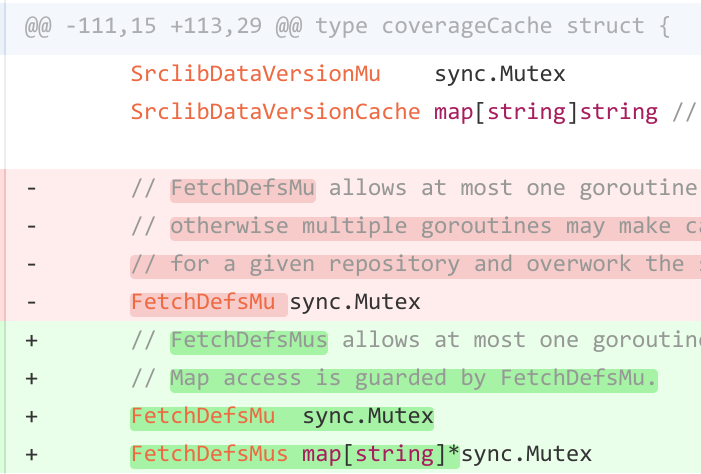
The Sourcegraph developer release: A better way to discover and understand code
null on May 30, 2016
Today we’re excited to announce a step toward giving every team the power to build better software — the developer release of Sourcegraph, the fast, semantic code search and cross-reference engine. As developers, we always wanted a better way to discover and understand code: Why can’t your code h...
Read more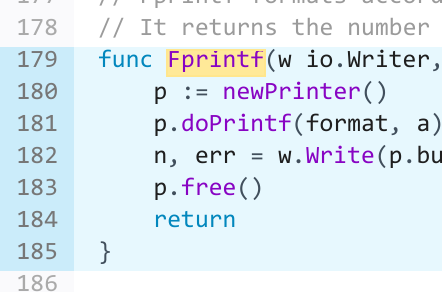
Why vacation at tech companies should be mandatory: better code, happier people
Quinn Slack on May 29, 2016
Can a policy that banks use to combat insider fraud also make tech companies produce better products and happier employees? Sure. At Sourcegraph, our mandatory vacation policy requires everyone to completely disconnect from work for at least 2 weeks each year — no exceptions.0*oDIH90jQ4ZzUANWM Ph...
Read more
The Sourcegraph Test: 12 more steps to better code
Quinn Slack on February 11, 2016
Do you use the best tools money can buy? We ask ourselves that a lot at Sourcegraph. It’s one of the questions in The Joel Test, Joel Spolsky’s classic 12-question benchmark of your team’s software engineering practices. Since he published the test in 2000, the “best tools money can buy” have…
Read more
Past liveblogs:Strange Loop • GopherCon and dotGo • GraphQL Summit • GitHub Universe

